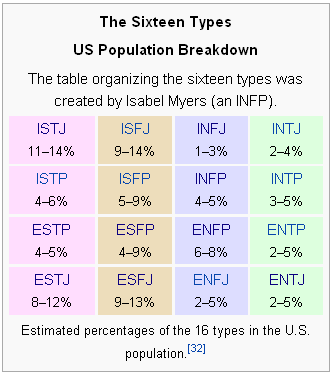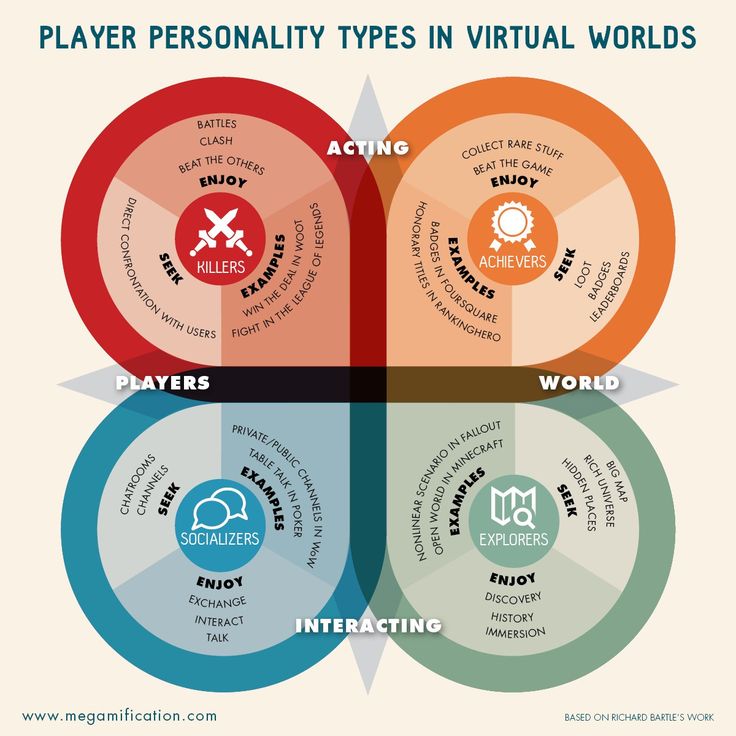Breakdown of personality types
What is the Most Common and Rarest Personality Type?
Human motivations vary from one psychological type to the other, but how often can these types be found in the general population? Many people are curious about which personality types are more common (or rare) than others – and want to know where their type falls on that scale. Below, you will find the estimated frequencies of each of the personality types (sorted per temperament) by total population and by gender.
Take our Free Personality Test to learn your personality type. This is the ultimate personality profile test, with more than 20 pages of results about you.
How rare or common are each of the 16 different personality types? Where do you fall on the scale? Does gender change the frequency of personality types? You will find the results that answer these questions on this page.
Page Contents
- The Percentages of the 16 Personalities
- Personality Type Percentages
- SJ Population Statistics
- SP Population Statistics
- NT Population Statistics
- NF Population Statistics
- Personality Type Percentages by Gender
- Rarest Personality Type
- Rarest Male Personality Type
- Rarest Female Personality Type
- Other Rare Personality Types
- Most Common Personality Type
- Personality Type Percentages
It should come as no surprise that the data on how 16 Briggs personality types are distributed is already well established. It is derived from data from the 16 Personalities Foundation themselves and, in the following article, you will see the curated statistics regarding each type in the United States’ population. For ease of reading, each batch of four personality types is categorized according to the temperament it belongs under. The discovery that these “batches” share similarities among each other, based on their personality preference, can be attributed to David Keirsey, Ph.D, a renowned clinical psychologist, author and professor at California State University, Fullerton.
Before we begin, as a reminder, here are what the personality type letters stand for:
- Extraversion vs. Introversion (E and I)
- Sensing vs. Intuition (S and N)
- Thinking vs. Feeling (T and F)
- Judging vs. Perceiving (J and P)
As you will see below, people who have the Sensing type, the Feeling type and the Judging type are more frequent than those with the Intuition type, the Thinking type and the Perceiving type.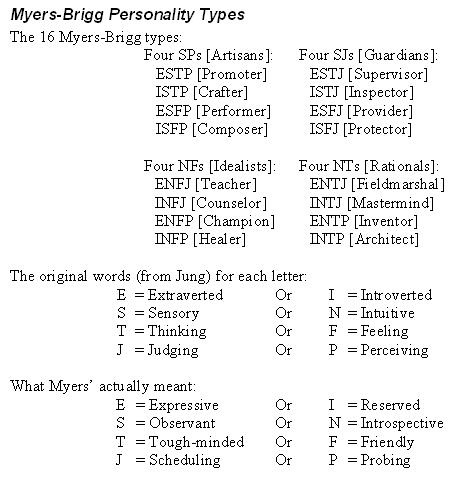 Down below you will find the distribution for the rest of the personality traits. Interestingly enough, both the Introvert and Extrovert nature is evenly distributed across the collected data.
Down below you will find the distribution for the rest of the personality traits. Interestingly enough, both the Introvert and Extrovert nature is evenly distributed across the collected data.
In each section, we have also included our own statistics, according to our own data. Our personality type percentages are our own personality type statistics drawn from the 6 million people who have taken our test.
Personality Type Percentages
Before we dive in deep, here’s a brief overview of what the type preference distribution looks like, as well as the frequency of each personality type.
This data is taken from the 16 Personalities Institute:
- Extroverted: 49.3%
- Introverted: 50.7%
- Sensing: 73.3%
- Intuition: 26.7%
- Thinking: 40.2%
- Feeling: 59.8%
- Judging: 54.1%
- Perceiving: 45.9%
This table shows the percentages for different personality types.
| Personality Type | 16 Personalities Percentage |
| INTJ | 2.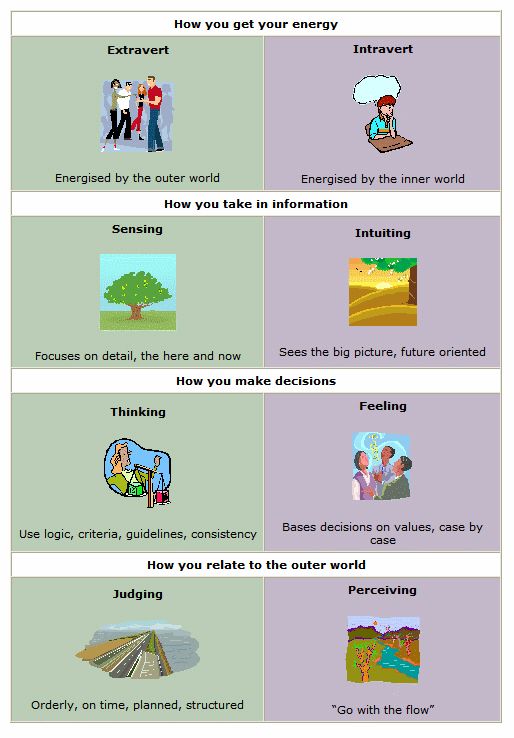 1% 1% |
| INTP | 3.3% |
| ENTJ | 1.8% |
| ENTP | 3.2% |
| INFJ | 1.5% |
| INFP | 4.4% |
| ENFJ | 2.5% |
| ENFP | 8.1% |
| ISTJ | 11.6% |
| ISFJ | 13.8% |
| ESTJ | 8.7% |
| ESFJ | 12% |
| ISTP | 5.4% |
| ISFP | 8.8% |
| ESTP | 4.3% |
| ESFP | 8.5% |
SJ Population Statistics
SJ temperament personality types (also known as Protectors) are observant, stable and motivated to keep their lives and those of their loved ones secure.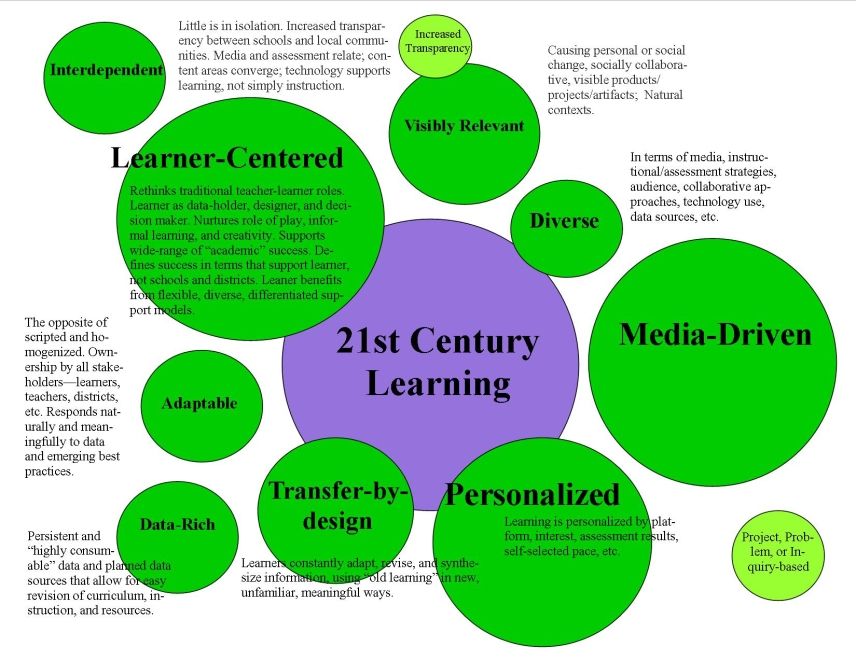 They are reliable, diligent and disciplined, often making excellent leaders.
They are reliable, diligent and disciplined, often making excellent leaders.
This table shows the personality type percentages for SJ temperaments:
| SJ Temperament Type | 16 Personalities Statistics | pMax Statistics |
| ESTJ | 8.7% | 4.5% |
| ESFJ | 12% | 2.3% |
| ISTJ | 11.6% | 8.6% |
| ISFJ | 13.8% | 2.8% |
TOTAL: 46.1%
SP Population Statistics
SP temperament personality types (also known as Creators) are experimental and primarily driven by sensation. They are very flexible, aesthetically aware and “here and now” type of people.
This table shows the personality type percentages for SP temperaments:
| SP Temperament Type | 16 Personalities Statistics | pMax Statistics |
| ESTP | 4.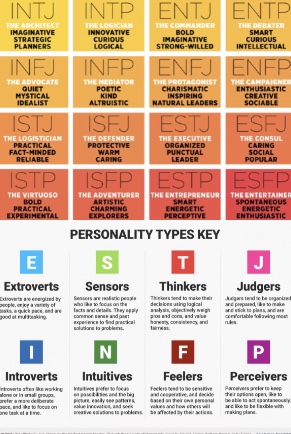 3% 3% | 3.2% |
| ESFP | 8.5% | 2.9% |
| ISTP | 5.4% | 5.1% |
| ISFP | 8.8% | 2.8% |
TOTAL: 27%
NT Population Statistics
NT temperament personality types (also known as Intellectuals) are introspective, logical and on a constant quest for knowledge. They are abstract, theoretical and technically adept.
This table shows the personality type percentages for NT temperaments:
| NT Temperament Type | 16 Personalities Statistics | pMax Statistics |
| ENTJ | 1.8% | 4% |
| ENTP | 3.2% | 6.6% |
| INTJ | 2.1% | 7.8% |
| INTP | 3.3% | 11.9% |
TOTAL: 10.4%
NF Population Statistics
NF temperament personality types (also known as Visionaries) are introspective and intuitive types, who are also highly idealistic. They are compassionate, with a desire to contribute goodness and meaning into the world.
They are compassionate, with a desire to contribute goodness and meaning into the world.
This table shows the personality type percentages for NF temperaments:
| NF Temperament Type | 16 Personalities Statistics | pMax Statistics |
| ENFJ | 2.5% | 2.9% |
| ENFP | 8.1% | 11% |
| INFJ | 1.5% | 4.2% |
| INFP | 4.4% | 19.4% |
TOTAL: 16.5%
Personality Type Percentages by Gender
Of course, there are some personality differences in the distribution of personality types by gender. Some types have more male representation as opposed to female and vice versa. Sadly, the 16 Personalities Institute doesn’t provide information on this, so we had to use our own data to present the findings.
To supplement our data, we have also turned to another well-known and authoritative study on gender differences and stereotypes.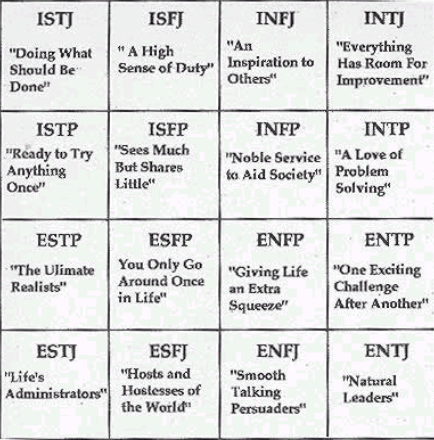 This normative study was conducted in 1996 by Allen Hammer and Wayne Mitchell, and is titled “The Distribution of Personality Types In General Population.” It surveyed 1267 adults on a number of different demographic factors. One of these factors was gender, and its findings can be used to show certain gender trends in temperament preferences in males and females.
This normative study was conducted in 1996 by Allen Hammer and Wayne Mitchell, and is titled “The Distribution of Personality Types In General Population.” It surveyed 1267 adults on a number of different demographic factors. One of these factors was gender, and its findings can be used to show certain gender trends in temperament preferences in males and females.
Below you will find what we (and they) discovered. This table shows the average distributions of the 16 different personality types by gender.
| TOTAL | MALE | FEMALE | |
| INTJ | 2.1% | 3.3% | 0.9% |
| INTP | 3.3% | 4.8% | 1.7% |
| ENTJ | 1.8% | 2.7% | 0.9% |
| ENTP | 3.2% | 4.0% | 2.4% |
| INFJ | 1.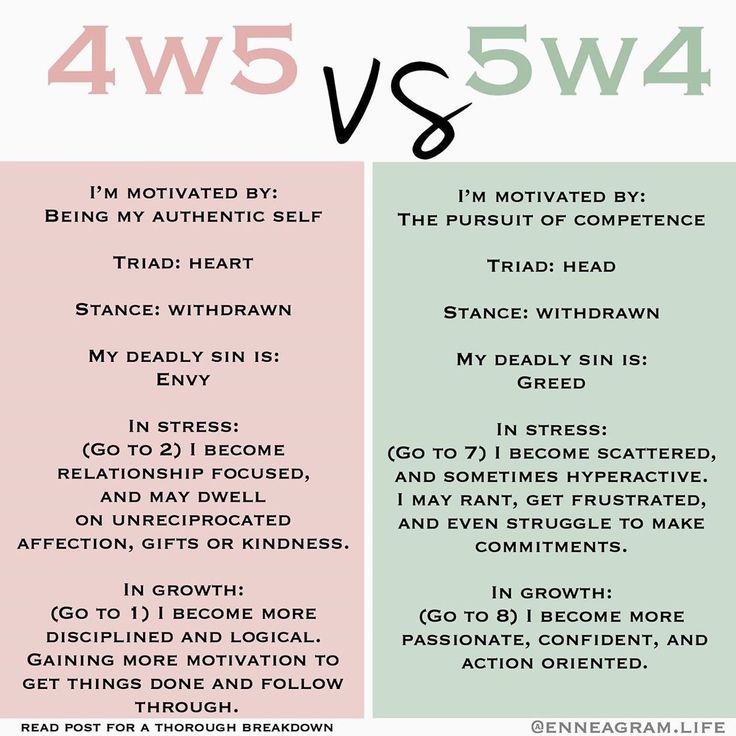 5% 5% | 1.2% | 1.6% |
| INFP | 4.4% | 4.1% | 4.6% |
| ENFJ | 2.5% | 1.6% | 3.3% |
| ENFP | 8.1% | 6.4% | 9.7% |
| ISTJ | 11.6% | 16.4% | 6.9% |
| ISFJ | 13.8% | 8.1% | 19.4% |
| ESTJ | 8.7% | 11.2% | 6.3% |
| ESFJ | 12% | 7.5% | 16.9% |
| ISTP | 5.4% | 8.5% | 2.3% |
| ISFP | 8.8% | 7.6% | 9.9% |
| ESTP | 4.3% | 5.6% | 3.0% |
| ESFP | 8.5% | 6.9% | 10.1% |
Rarest Personality Type
Again, according to the 16 Personalities institute, the INFJ personality type is the world’s rarest personality type.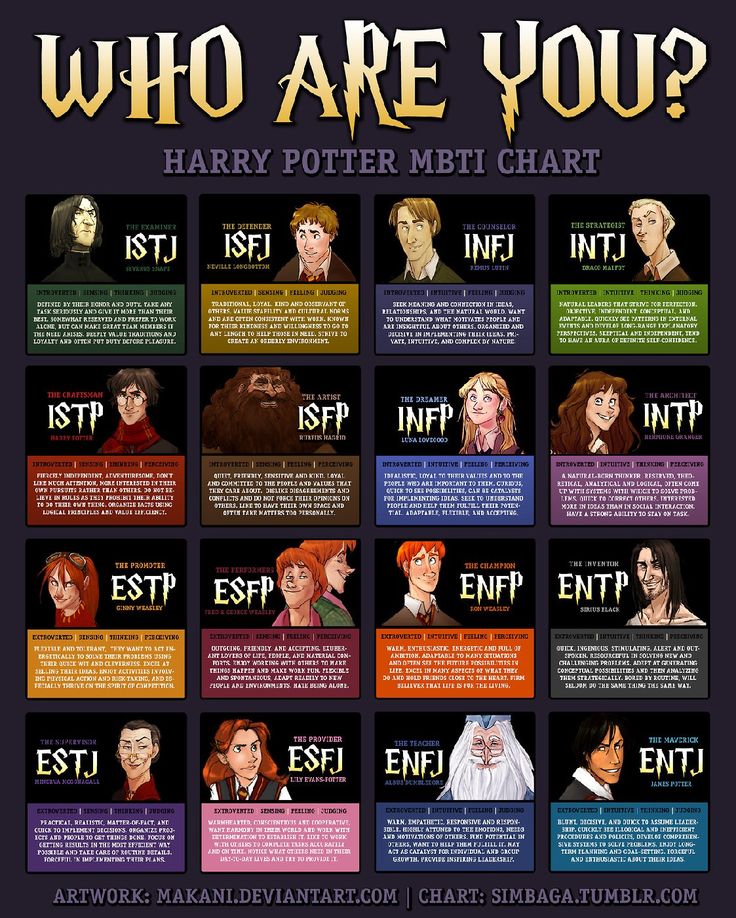 This makes sense as this type has Introverted, Intuitive, Feeling and Judging preferences — which makes them quiet and sheltered people, that are very much in tune with people’s feelings. If a person has this combination of preferences, it’s easy to understand why they would prefer to blend in with their environment, rather than stand out, as they are an introvert. There might be more people that share the INFJ personality traits out there – they just may not like to make themselves known to the world.
This makes sense as this type has Introverted, Intuitive, Feeling and Judging preferences — which makes them quiet and sheltered people, that are very much in tune with people’s feelings. If a person has this combination of preferences, it’s easy to understand why they would prefer to blend in with their environment, rather than stand out, as they are an introvert. There might be more people that share the INFJ personality traits out there – they just may not like to make themselves known to the world.
According to our data, the rarest personality type is ESFJ. A person with this personality type is caring, supportive and is concerned for everyone’s well being and happiness. According to the official 16 personalities data, the ESFJ personality type makes up for 12% of the US population. This difference in statistics may be due to difference in sample size (PMax sampled 6 million people), difference in demographics (PMax has test respondents from different countries, not only from the Unites States) and the fact that people from a certain personality type are more prone to answer surveys, such as the 16 personalities test, compared to others.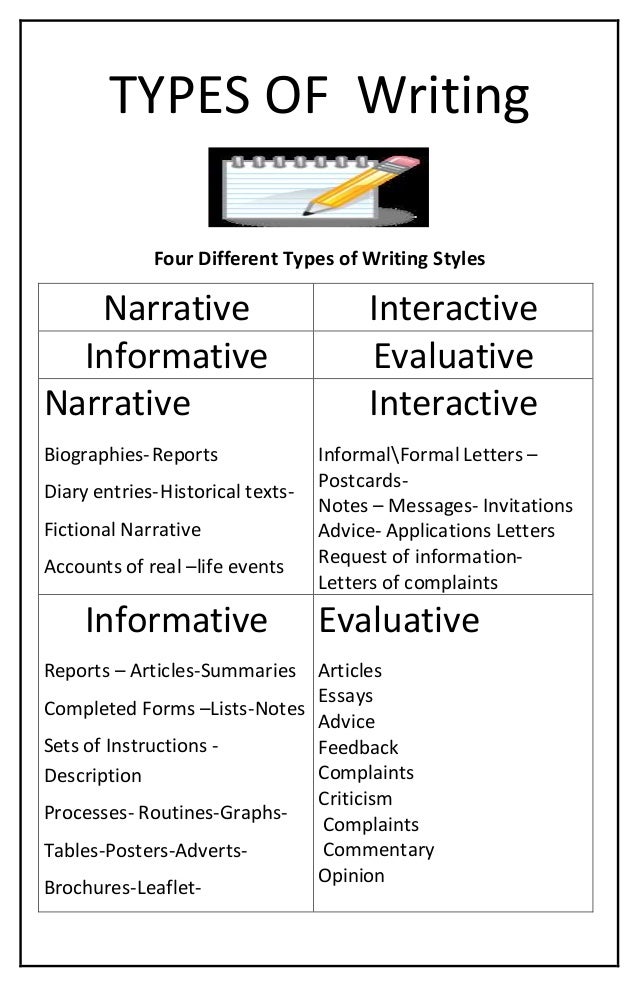
Rarest Male Personality Type
Our data shows that the rarest male personality type is INFJ. INFJ men make up only about 0.5% of the total males tested. They are introverted, feeling, gentle and idealistic, but still capable of making decisions and carrying on with their goals. They aren’t static spectators — their belief that good and love will save the world compels them to act. Their superior understanding of people’s emotions makes them very empathic and easy to connect to.
Male Temperament Preferences
According to the Hammer-Mitchell study, 68.6% of men have Thinking personality preferences compared to 38.8% of women. This can explain why INFJ is the rarest type among men. This does not mean that men don’t show any Feeling nature — it simply means that a man, as a stereotype, is more likely to be a Thinking type. It also means that men use the Thinking trait more when it comes to decision-making processes. Even if they are more prone to relying on this preference, it is important to know in which situations it’s important to tune into their Feeling nature.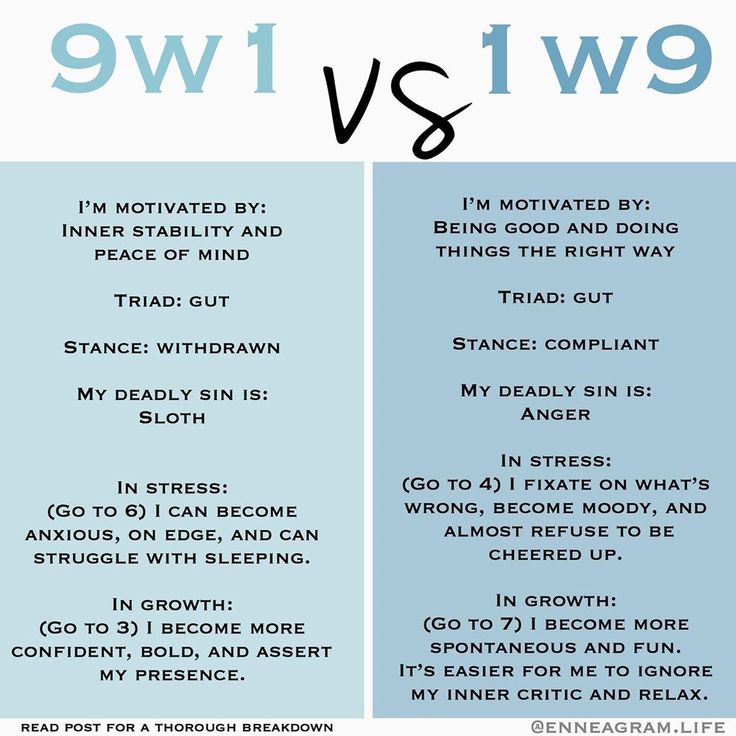 This is a skill worth training.
This is a skill worth training.
Rarest Female Personality Type
Our data shows that the rarest female personality type is INTJ. Female INTJs also make up about 0.5% of the total females tested. These ambitious, introverted and bold people are unbothered by the general opinion of the masses and are not afraid to pursue their own philosophy of life. Their strategic nature compels them to avoid the spotlight and to work from the shadows. This is why they can often be seen alone — but they don’t mind this at all. For them, every move they make in life is carefully considered and planned in advance.
Female Temperament Preferences
Similarly to the above statistic, the Hammer-Mitchell study found that 61.2% of women prefer Feeling compared to 31.4% of men. This can explain why a female INTJ is in fact a rare personality type. Again, this does not mean that women are oblivious to the Thinking personality trait, but rather that they have a different type of personality characteristics.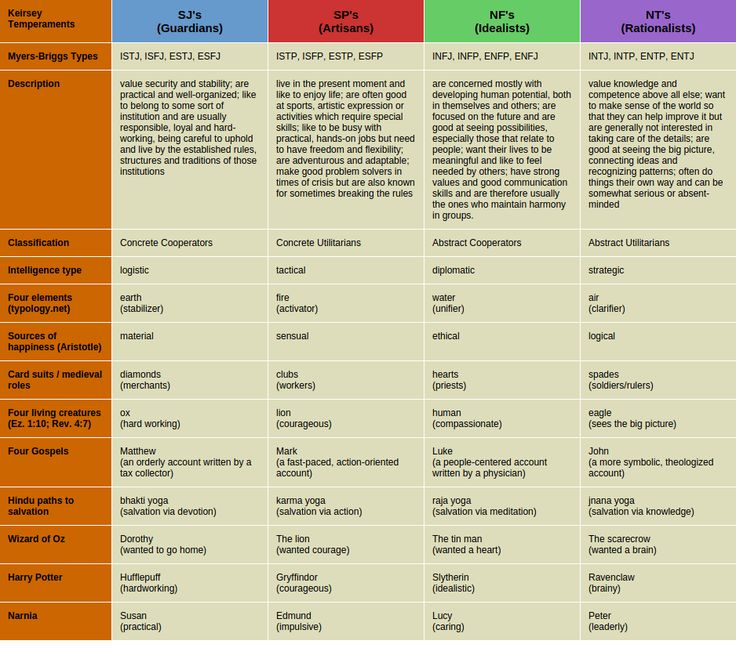 A worthy analogy is that we all have two hands, but we might prefer our right one to do things with, rather than our left one. Or we might throw a ball with our right hand but catch it with our left, and vice versa. Again, when it comes to situations that demand a certain decision to be made, it is important to know which preference should take precedence — be it following your gut feeling or what common sense tells you. This is a skill that can be trained through a number of different techniques — emotional intelligence being one, for example.
A worthy analogy is that we all have two hands, but we might prefer our right one to do things with, rather than our left one. Or we might throw a ball with our right hand but catch it with our left, and vice versa. Again, when it comes to situations that demand a certain decision to be made, it is important to know which preference should take precedence — be it following your gut feeling or what common sense tells you. This is a skill that can be trained through a number of different techniques — emotional intelligence being one, for example.
With INFJ being the rarest personality type, what are some other rare personality types? Here are the top 5 of the rarest personalities according to the 16 Personalities Institute:
- INFJ: 1.5%
- ENTJ: 1.8%
- INTJ: 2.1%
- ENTP: 3.2%
- INTP: 3.3%
Most Common Personality Type
The most common personality type according to the 16 Personalities Institute is ISFJ, the Defender.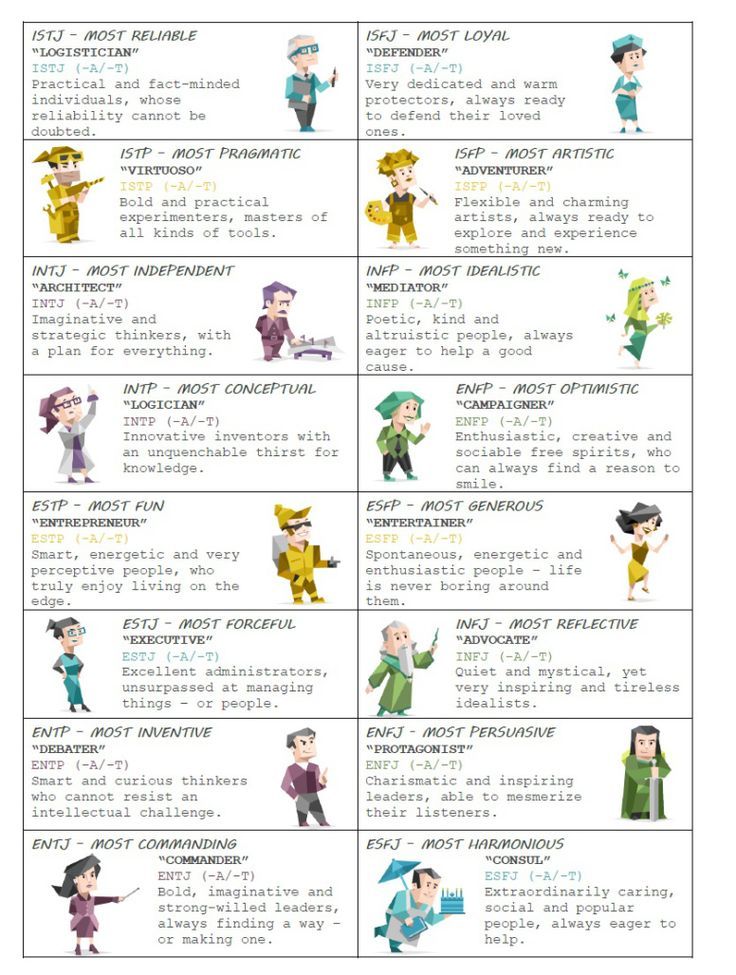 This type makes up 13.8% of the US population. This is also not surprising, as they are very logical and traditional people — there is a very big chance you know someone like that in your surroundings. They can be often found in institutions where procedures are key — administration, for example. This personality type is predominantly female — it has only 29% male representation.
This type makes up 13.8% of the US population. This is also not surprising, as they are very logical and traditional people — there is a very big chance you know someone like that in your surroundings. They can be often found in institutions where procedures are key — administration, for example. This personality type is predominantly female — it has only 29% male representation.
According to our data, the most common personality type is INFP. This perceiving type is shy, quiet, feeling and might seem secluded. However, from the inside these people are empathetic, harmonious and maintain rich inner workings. Perhaps the reason why our statistics found that this is the most common personality type is because INFPs are more prone to want to learn more about themselves, hence are more likely to take personality tests such as ours.
Other Common Personality Types
With ISFJ being the most common personality type, what are some other common personality types? Here are the top 5 most common personality types according to the 16 Personalities Institute:
- ISFJ: 13.
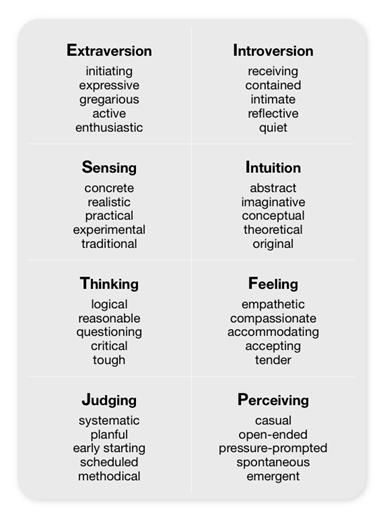 8%
8% - ESFJ: 12.3%
- ISTJ: 11.6%
- ISFP: 8.8%
- ESTJ: 8.7%
Best Career Matches for Each Personality Type
Have you ever wondered what the best career match is for each of the personalities? What type of workers are SJ Temperament types, or NT ones? Listed below are satisfying careers for each of the 16 personality types.
Take our Free Personality Test to learn your personality type and get career matches specific to your personal results.
Page Contents
- SJ Career Matches (Pragmatists)
- SP Career Matches (Originators)
- NT Career Matches (Analyzers)
- NF Career Matches (Empaths)
SJ Career Matches (Pragmatists)
SJ personality types (people who possess the Sensing and Judging preferences) are unmatched when it comes to practical problem-solving, organization, and structure. They are highly reliable people who don’t let go of a task until they finish it.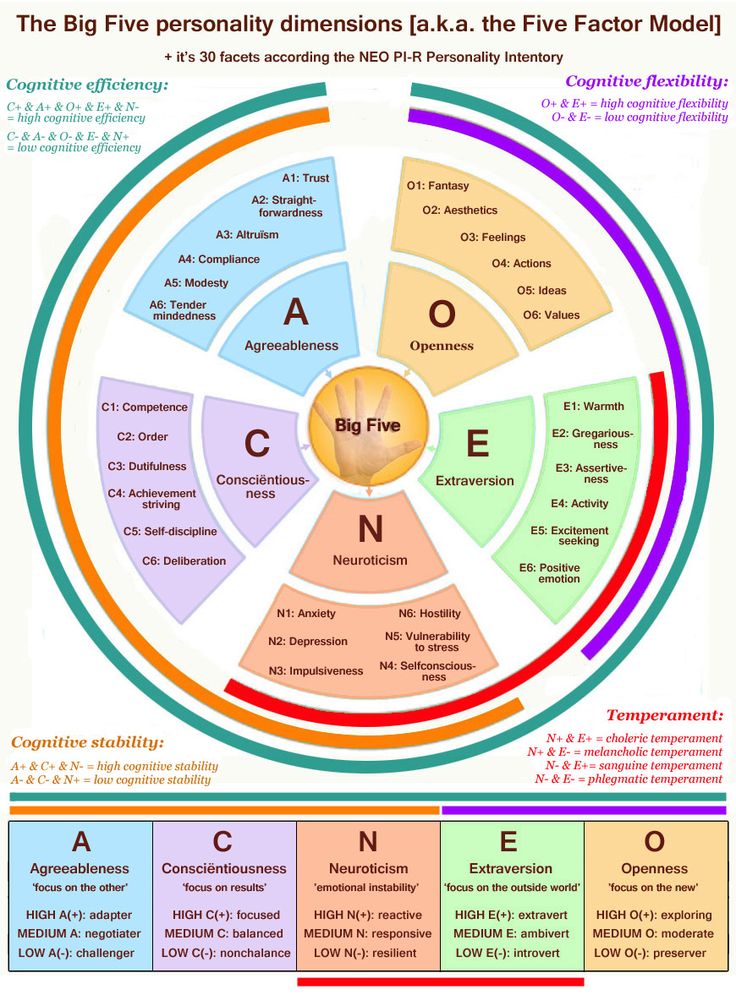 Their decision-making process is based primarily on objective facts and logic, and they are very results-oriented. SJ types prefer clear definition in their activities and value structure in the way they work and spend their time.
Their decision-making process is based primarily on objective facts and logic, and they are very results-oriented. SJ types prefer clear definition in their activities and value structure in the way they work and spend their time.
ESTJ Career Matches (The Administrator)
An ESTJ, or The Administrator, often ends up being the person in charge, and this is perfect for them, since they wouldn’t have it any other way. They are also sometimes nicknamed The Overseer, so taking charge of situations and guiding others in pursuit of common goals comes naturally to them. What’s more, they often climb very high up the ladder in any sphere. The fact that at least ten U.S. presidents, including Andrew Jackson and Harry S. Truman, are believed to have been ESTJs is a testament to the abilities of this personality type.
These are people who are able to make quick, informed, and logical decisions. In their work, they like to deal with real-world problems rather than abstract or philosophical matters.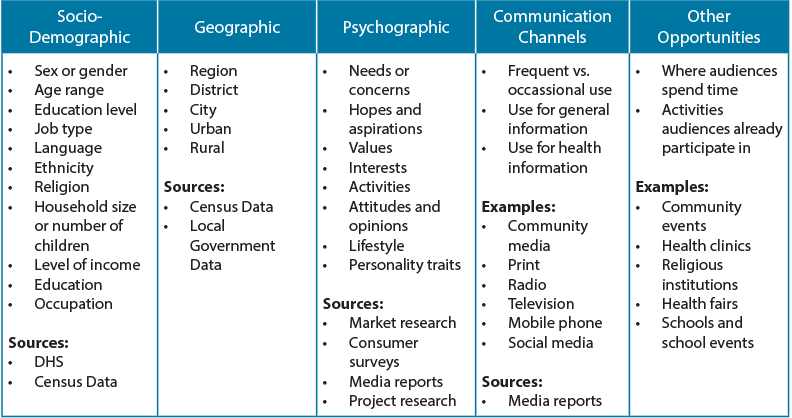 This is why it should come to no surprise that they often tackle issues head on, without hesitation or emotional constraints. ESTJs have the ability to quickly assess situations and take necessary action for the best possible result. Most of the time, they won’t rest until they have completed the task at hand.
This is why it should come to no surprise that they often tackle issues head on, without hesitation or emotional constraints. ESTJs have the ability to quickly assess situations and take necessary action for the best possible result. Most of the time, they won’t rest until they have completed the task at hand.
Here are several career matches that fit ESTJs’ personality traits:
- Accountant
- Senior Manager
- Auditor
- Military Officer
- Banker
- Financial Officer
- Government Worker
- Engineer
- Police Officer
- Business Administrator
- Business Analyst
- Computer Specialist
- Detective
- Scientist
- Judge
- Insurance Agent
- Economist
- Teacher
- Editor
- Technical Specialist
- Nursing Administrator
- Underwriter
- Professor
- Lecturer
- Manager
- Librarian
- Researcher
ESFJ Career Matches (The Caregiver)
Out of all the personality types, ESFJs are among the most dedicated when it comes to their duties.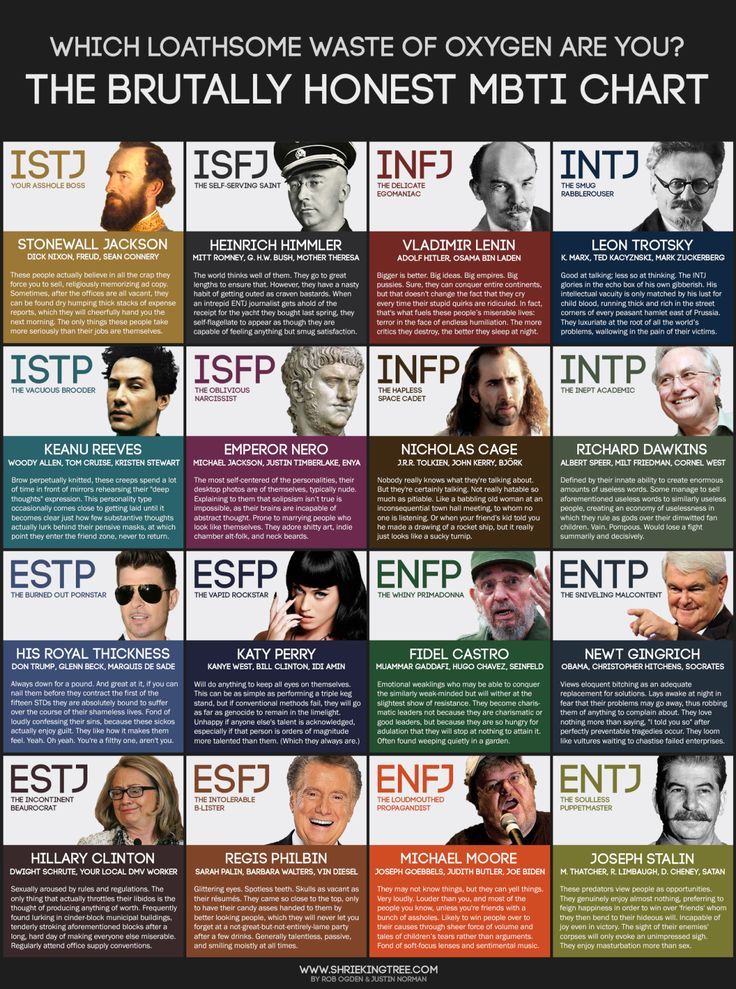 Loyal and decisive, they have a results-oriented mindset, and they’re go-getters who plan meticulously and then take action. Their easy warmth, attentiveness, and enthusiasm serve them well in professional settings – they’re nicknamed The Caregiver for a reason. ESFJs are consistently mindful of others’ feelings, balancing pragmatism with compassion. It’s essential for them to have clear roles and guidelines in their work environment so they can perform at their best.
Loyal and decisive, they have a results-oriented mindset, and they’re go-getters who plan meticulously and then take action. Their easy warmth, attentiveness, and enthusiasm serve them well in professional settings – they’re nicknamed The Caregiver for a reason. ESFJs are consistently mindful of others’ feelings, balancing pragmatism with compassion. It’s essential for them to have clear roles and guidelines in their work environment so they can perform at their best.
ESFJs are likely to be attracted to people-facing roles where they can make meaningful human connections. Solitary roles leave them feeling restless – they would rather work alongside a team that they can interact with throughout the day. Emotional feedback is crucial for them, and they want to feel affirmed and validated. When they visibly help others flourish, ESFJs become more driven than ever.
Here are several career matches that fit ESFJs:
- Accountant
- Bookkeeper
- Childcare Worker
- Church Worker
- Human Resources
- Counselor
- Family Doctor
- Homemaker
- Nurse
- Teacher
- Social Worker
- Office Manager
- Administrator
- Speech Pathologist
- Organization Leader
- Receptionist
ISTJ Career Matches (The Archivist)
The Archivist is dependable and meticulous in any area of their lives, and work is no exception.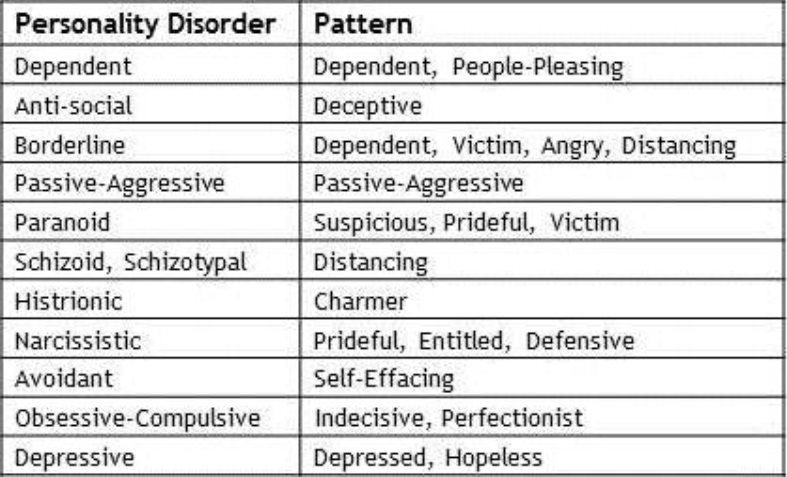 ISTJ people take their responsibilities and deadlines very seriously, which is why they quickly establish themselves as rigorous and punctual workers. They are able to work independently (and in fact prefer it over working in a team) and take a systematic approach to their tasks. ISTJs thrive in a stable working environment, where there are little to no unexpected surprises.
ISTJ people take their responsibilities and deadlines very seriously, which is why they quickly establish themselves as rigorous and punctual workers. They are able to work independently (and in fact prefer it over working in a team) and take a systematic approach to their tasks. ISTJs thrive in a stable working environment, where there are little to no unexpected surprises.
If they have to work in a team, ISTJs appreciate collaborating with like-minded individuals. They work especially well when there is a clear hierarchy that tells the people in the group where they stand, so they can act accordingly. An ideal job for ISTJs is one that allows them to solve their problems in an orderly and logical way. These introverted types value a quiet and structured environment, with ample rules and regulations to guide them through the work process.
Here are several career matches that fit ISTJs:
- Accountant
- Military Officer
- Police Officer
- Administrator
- Auditor
- Medical Doctor
- Dentist
- Financial Officer
- Detective
- Scientist
- Math Teacher
- Lawyer/Attorney
- Judge
- Manager
- Computer Programmer
- Computer Specialist
- Librarian
- Executive
- Steelworker
- Electrician
- Mechanical Engineer
- Systems Analyst
- Technical Specialist
- Technician
ISFJ Career Matches (The Defender)
ISFJs love to help others out, which is why they will typically lean toward careers that involve service or caretaking.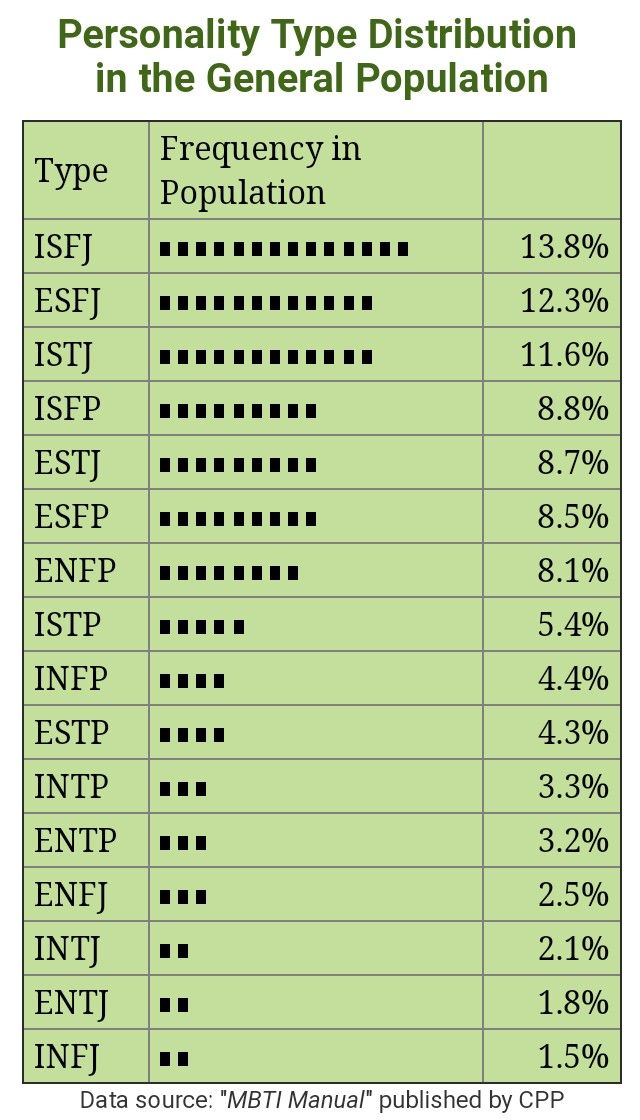 Nicknamed The Defender, they strongly believe that society should function in a certain way. And as fierce defenders of tradition, they also believe that there is a strict and specific path to follow when one wants to help others. ISFJs are the type of people who probably originated the saying “if it ain’t broke, don’t fix it”. However, this way of thinking can be limiting, especially in a world that is always advancing towards new technologies and methodologies. The ISFJ’s adherence to tradition isn’t their only potential obstacle, however; sometimes, in their altruism, they can get so caught up in helping others that they can forget to take care of themselves.
Nicknamed The Defender, they strongly believe that society should function in a certain way. And as fierce defenders of tradition, they also believe that there is a strict and specific path to follow when one wants to help others. ISFJs are the type of people who probably originated the saying “if it ain’t broke, don’t fix it”. However, this way of thinking can be limiting, especially in a world that is always advancing towards new technologies and methodologies. The ISFJ’s adherence to tradition isn’t their only potential obstacle, however; sometimes, in their altruism, they can get so caught up in helping others that they can forget to take care of themselves.
Nevertheless, the perfect career for an ISFJ must be built around their strengths. They are committed, hardworking, supportive, patient, and extremely reliable people. With this impressive list of personality traits, they can be the ideal employee in positions that require cool-minded people who can keep their calm and stick to the plan, even in an emergency or high-pressure scenario.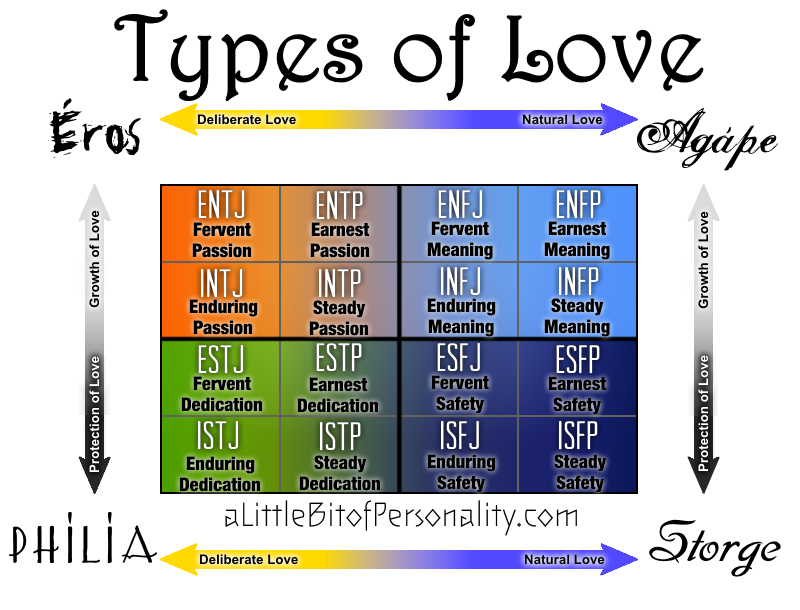
Here are several career matches that fit ISFJs:
- Administrator
- Career Counselor
- Childcare Worker
- Police Officer
- Church Worker
- Clerical Supervisor
- Counselor
- Medical Doctor
- Social Worker
- Actor/Actress
- Counselor
- Human Resources
- Medical Technologist
- Office Manager
- Shopkeeper
- Researcher
- Scientist
- Senior Manager
- Early Childhood Development
- Librarian
- Nurse
- Auditor
- Bookkeeper
- Business Analyst
- Health Service
- Homemaker
- Writer
- Military
- Accountant
- Administrative Assistant
SP Career Matches (Originators)
SP personality types are spontaneous and flexible; they love their freedom. They aren’t particularly suited for dealing with data or routine, mundane activities. Originators thrive on unexpected circumstances and flourish in jobs in which no two days are ever the same.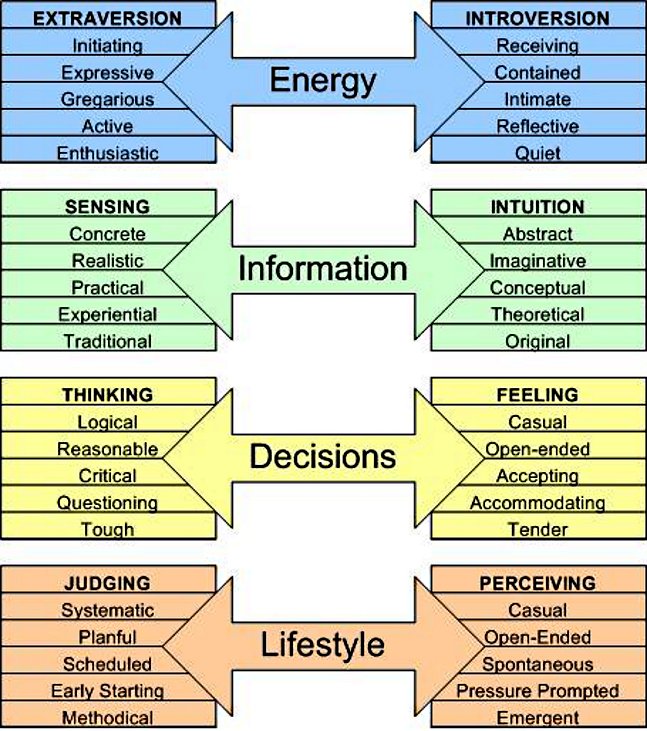 Since they are also very pragmatic and objective about the world around them, SP personality types are natural problem-solvers.
Since they are also very pragmatic and objective about the world around them, SP personality types are natural problem-solvers.
ESTP Career Matches (The Daredevil)
ESTPs are as extroverted as extroverts can get. They enjoy working in teams and do their best to keep the atmosphere light and friendly. They tend to be flexible and open-minded, which can be a valuable asset in crises that demand instant solutions. On the other hand, this tendency to do things their own way, accompanied by their brutally honest, often demanding communication style may lead them into conflicts with co-workers who prefer to stick to detailed plans. Overall, ESTPs are likely to shine in the workplace with their numerous skills. They are charming and sociable coworkers, cracking jokes wherever they go.
The Daredevil thrives in fast-paced, ever-changing environments. As a bold and daring risk taker, they can get bored very quickly, which is why they require some extra diversity when it comes to their work.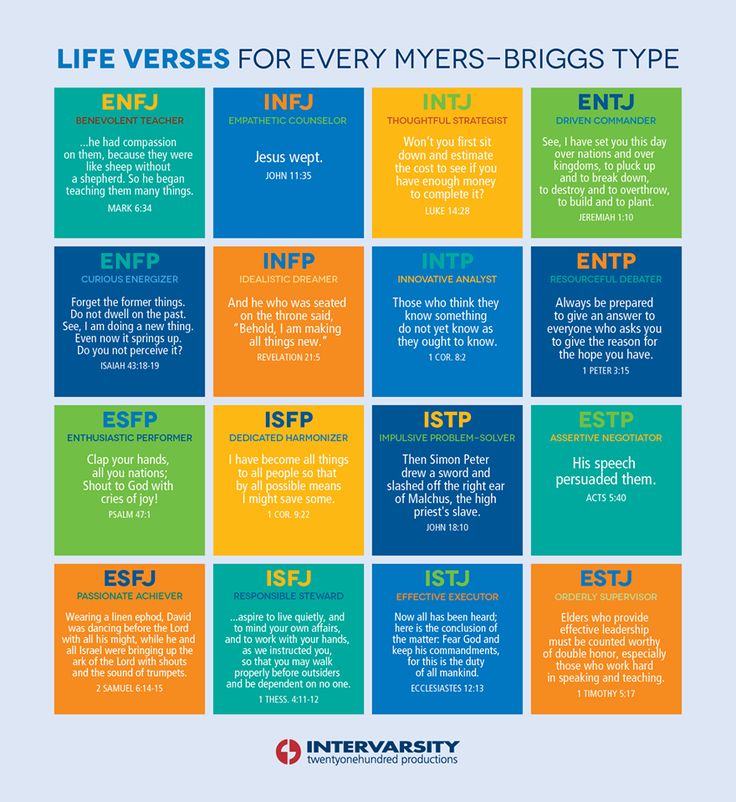 Even a tense, demanding, or competitive environment will bring out the best qualities in an ESTP.
Even a tense, demanding, or competitive environment will bring out the best qualities in an ESTP.
Here are several career matches that fit ESTPs:
- Carpenter
- Craftsman
- Paramedic/EMT
- Police Officer
- Detective
- Driver
- Firefighter
- Military Service Member
- Farmer
- Comedian
- IT Support
- Entrepreneur
- Marketer
- Project Manager
- Computer Technician
- Sales Agent
ESFP Career Matches (The Entertainer)
As an extrovert who enjoys being among people and participating in diverse activities, an ESFP will prefer working in a team over working in isolation. Any career that involves active work with others is very well-suited for them. The Entertainer personality is worthy of their name – they can effortlessly captivate any group of people and tend to be very likable. They may not be fully task-oriented, but as highly perceptive types, they will be aware of the needs of those around them.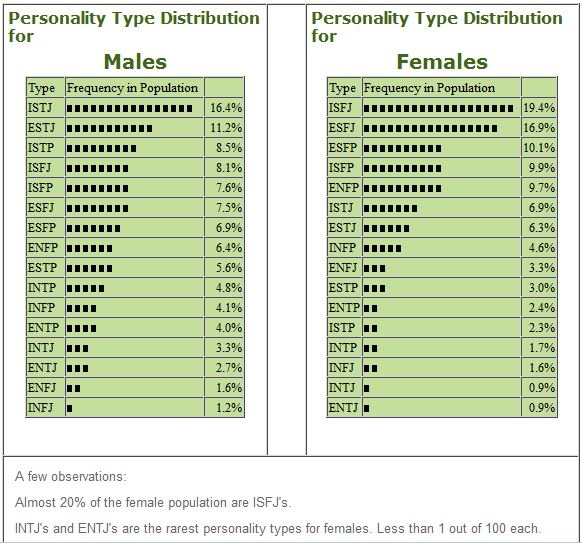 What’s more, they are often willing to go above and beyond to fulfill those needs.
What’s more, they are often willing to go above and beyond to fulfill those needs.
Jobs that involve little to no human contact or careers that are solely focused on data and hard, logical decisions will never fully engage an Entertainer. Even if ESFPs pick up a job in a technical field, they are likely to burn out or desire a change after a while. Schedules and strict structure, combined with mundane, repetitive activities, will also have ESFPs running for dear life.
Even so, there are plenty of suitable careers for this personality type. Here’s a few:
- Athlete
- Artist
- Actor/Actress
- Coach
- Fashion Designer
- Entrepreneur
- Social Worker
- Recreation Worker
- Comedian
- Interior Decorator
- Marketer
- Musician
- Painter
- Performer
- Photographer
- Public Relations
- Receptionist
- Supervisor
- Broadcaster/Newscaster
- Pediatrician
- Singer
- Nurse
- Manager
- Sales Agent
- Teacher
- Journalist
- Shopkeeper
- Animal Trainer
- Firefighter
- Dancer
- Public Speaker
- Events Coordinator
ISTP Career Matches (The Tinkerer)
There’s no one who appreciates their freedom more than the energetic ISTP.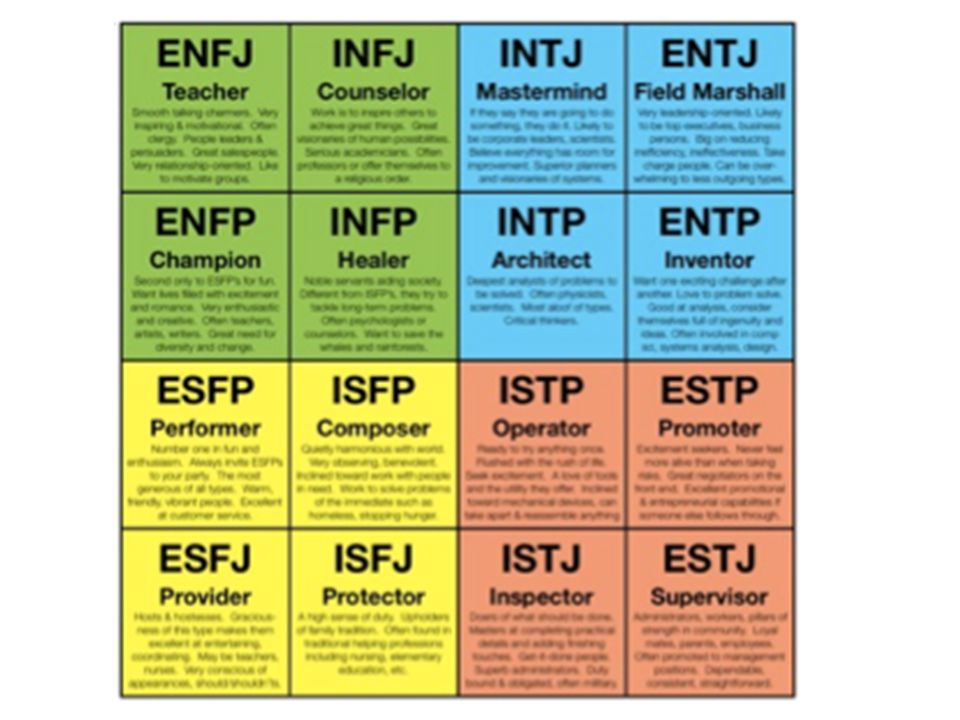 These born problem-solvers can’t bear to be confined in an office or any environment that forces them to follow a set structure. They are people who like to leave their individual mark on everything they do, which is why they often try to make their own way in the world. The Tinkerer is incredibly curious, fascinated with the workings of the outside world. They don’t mind getting their hands dirty, and in fact, they prefer it that way. If you leave them to it, The Tinkerer can assemble and disassemble things all day long, living up to their name.
These born problem-solvers can’t bear to be confined in an office or any environment that forces them to follow a set structure. They are people who like to leave their individual mark on everything they do, which is why they often try to make their own way in the world. The Tinkerer is incredibly curious, fascinated with the workings of the outside world. They don’t mind getting their hands dirty, and in fact, they prefer it that way. If you leave them to it, The Tinkerer can assemble and disassemble things all day long, living up to their name.
The perfect job for an ISTP will be one that they don’t find confining. They will thrive in a job that allows them all the freedom they crave – to go by their own schedule, handle their own responsibilities, and do things their own way. ISTPs like to be able to evade situations they aren’t comfortable with, but make no mistake – this doesn’t make them irresponsible or untrustworthy. They simply tend to pick their commitments very carefully.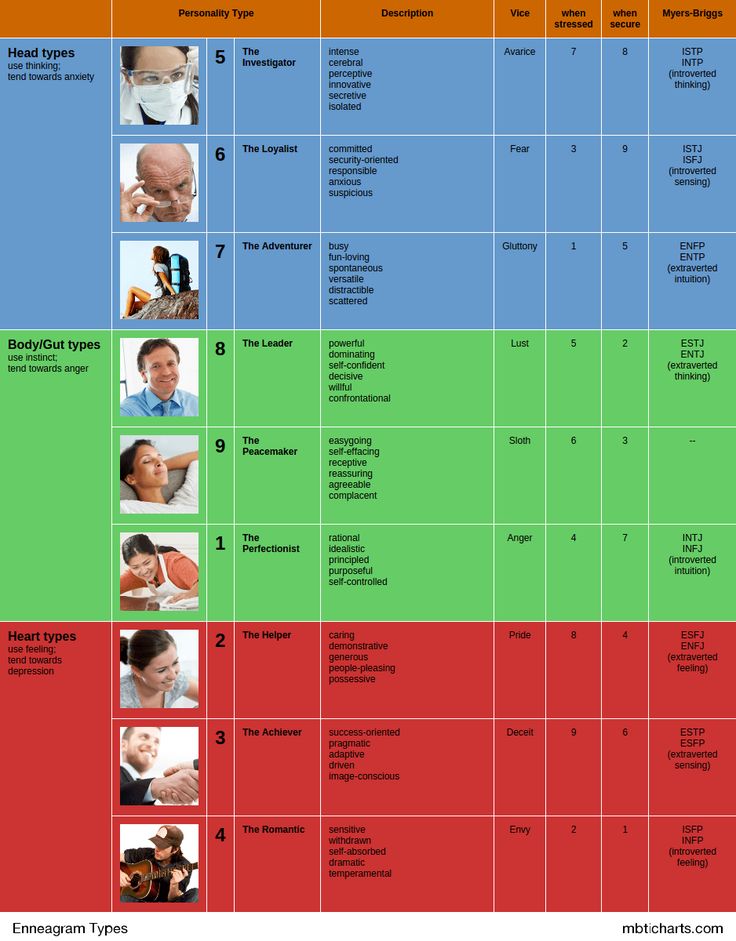
Here are some jobs in which an ISTP is likely to feel comfortable and fulfilled:
- Athlete
- Carpenter
- Construction Worker
- Mechanic
- Military
- Motorcyclist
- Paramedic/EMT
- Farmer
- Firefighter
- Forensic Pathologist
- Pilot
- Police Officer
- Probation Officer
- Detective
- Driver
- Electrical Engineer
- Engineer
- Steelworker
- Transportation Operative
- Marketer
- Computer Programmer
- Computer Specialist
- Project Manager
- Sales Agent
- Scientist
- Systems Analyst
- Technical Specialist
ISFP Career Matches (The Adventurer)
As a highly sensitive and caring personality type, The Adventurer will need their job to be more than just a job. They aren’t particularly drawn to achieving wealth, power, or dominance over others. Instead, they place their value on being able to practice their unique creative freedom.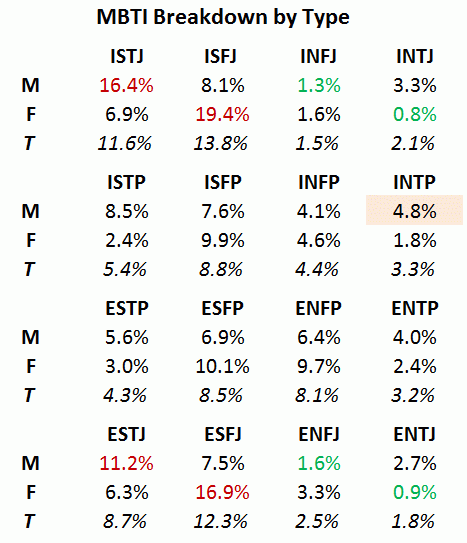 The Adventurer has a big and wild imagination that they aren’t afraid to tap into. They like to experiment and to express their views of the world, unconstrained by structure, rules, or public opinion.
The Adventurer has a big and wild imagination that they aren’t afraid to tap into. They like to experiment and to express their views of the world, unconstrained by structure, rules, or public opinion.
This is why the perfect job for an ISFP is one that allows them to walk to the beat of their own drum. If they are given the autonomy and personal space they so desperately need, they can flourish. In fact, this is how ISFPs truly thrive – the only way they can unleash their full potential out in the world. Sure, they might not make sense to others sometimes, but trust that they know what they are doing.
Here are some career matches for these free spirits:
- Artist
- Carpenter
- Teacher
- Chef
- Child Care
- Pediatrician
- Church Worker
- Composer
- Counselor
- Social Worker
- Designer
- Physical Therapist
- Veterinarian
- Early Childhood Development
- Park Ranger
- Librarian
- Editor
- Musician
- Naturalist
- Nurse
- Mechanic
- Writer
- Homemaker
NT Career Matches (Analyzers)
NT personality types exhibit great rationality and intellectual excellence. They like to be presented with challenging problems, and nothing pleases them more than having to think their way through to a solution. These personality types are very resourceful when coming up with ideas and are able to keep the bigger picture in mind when deciding on the best course of action.
They like to be presented with challenging problems, and nothing pleases them more than having to think their way through to a solution. These personality types are very resourceful when coming up with ideas and are able to keep the bigger picture in mind when deciding on the best course of action.
ENTJ Career Matches (The General)
ENTJs are extroverted, reliable, and self-directed people. Challenges motivate them, and they have a drive towards constant self-improvement. Although some have the tendency to become workaholics, The General is consistently effective in their work – they like to get things done. As an extrovert, they are likely to prefer careers that give them the chance to think through their ideas by talking about them. Communication is key to their performance. Also, The General is superb at multitasking. It’s not a rare sight to witness them managing and directing several projects at the same time, while still delivering stellar results.
ENTJs are extremely ambitious people. They aim for jobs where they can climb the corporate ladder while still managing to challenge themselves daily. If ENTJs make it their mission to become good at something, they’ll never stop until they achieve it. Although they feel the most comfortable at professions that involve business, management, and entrepreneurship, they can be good at basically anything.
They aim for jobs where they can climb the corporate ladder while still managing to challenge themselves daily. If ENTJs make it their mission to become good at something, they’ll never stop until they achieve it. Although they feel the most comfortable at professions that involve business, management, and entrepreneurship, they can be good at basically anything.
Here’s a peek into just how diverse the perfect matches for an ENTJ can be:
- Business Administrator
- Executive
- Entrepreneur
- Manager
- Politician
- Computer Consultant
- Lawyer/Attorney
- Judge
- Scientist
- Banker
- Systems Analyst
- Teacher
- Professor
ENTP Career Matches (The Debater)
The Debater is a champion when it comes to brainstorming new ideas or campaigns. They are quick to examine the problem at hand from a number of different angles, and they can work quickly to come up with a solution while everyone else is still assimilating the task.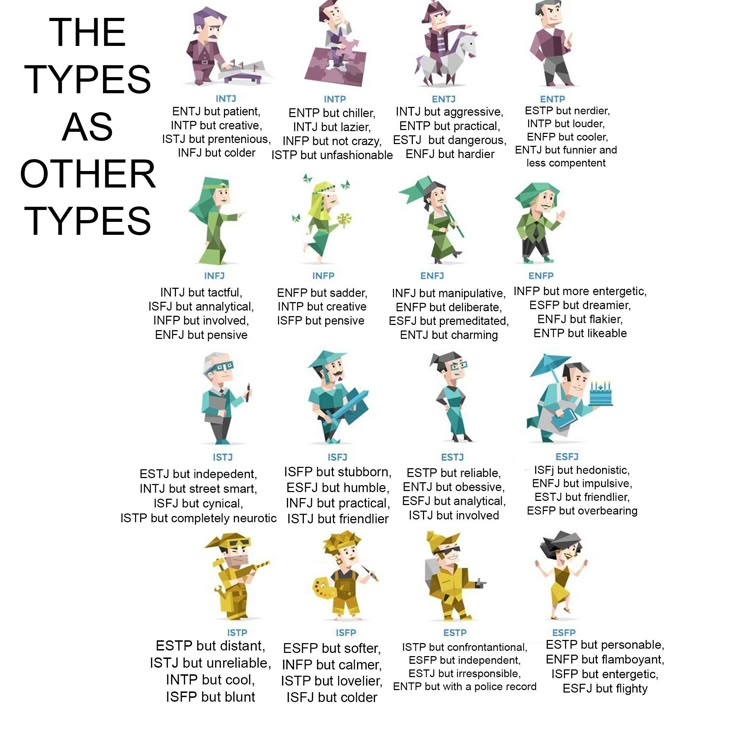 Because of their quick thinking, ENTPs are valued members of any organization. Even when the rest of their colleagues catch up with them, the ideas that ENTPs present are often the most innovative and impressive ones. The Debater is unparalleled when it comes to finding solutions or fixing the unfixable.
Because of their quick thinking, ENTPs are valued members of any organization. Even when the rest of their colleagues catch up with them, the ideas that ENTPs present are often the most innovative and impressive ones. The Debater is unparalleled when it comes to finding solutions or fixing the unfixable.
ENTPs don’t neglect creative brainstorming for practicality. The perfect job for them will challenge them to use their brain and let their intellect shine bright. In contrast, careers that demand routine tasks and rigorous attention to small details are a big drawback in the eyes of a Debater.
Let’s see what careers these bold intellectuals are likely to enjoy:
- Engineer
- Computer Analyst
- Computer Programmer
- Entrepreneur
- Inventor
- Journalist
- Lawyer/Attorney
- Marketer
- Politician
- Psychiatrist
- Psychologist
- Consultant
- Scientist
- Systems Analyst
- Writer
- Photographer
- Sales Agent
- Comedian
- Actor/Actress
- Musician
INTJ Career Matches (The Mastermind)
INTJs are typically characterized by their profound intellect and wisdom, as well as their discipline and perfectionism.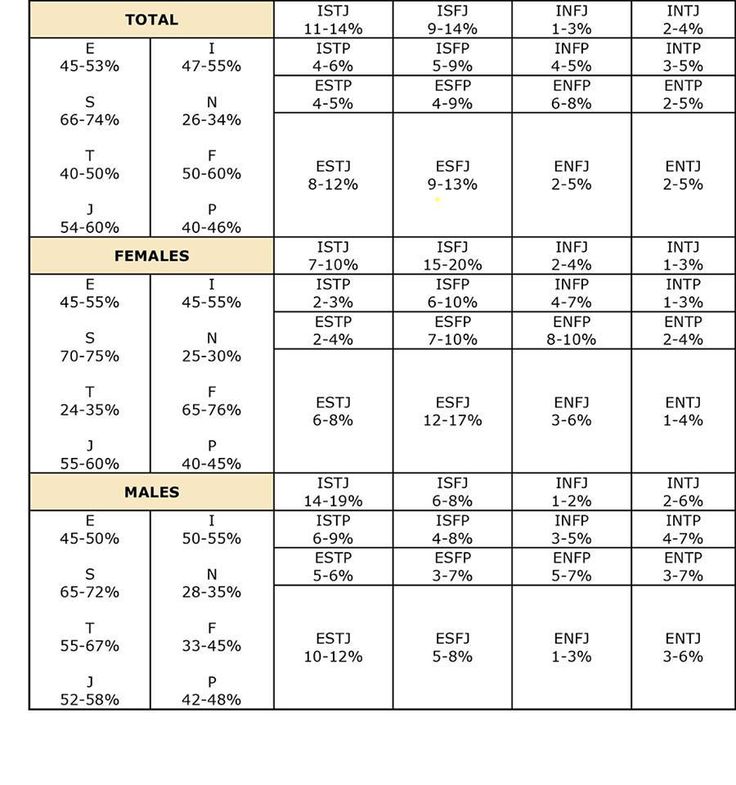 They are people who like structure and organization in every aspect of their lives. The Mastermind’s reliability can never be questioned, and you can be sure that they will always give their honest opinion about things – no matter what it may be. One would assume that finding the perfect career match would be an easy task for The Mastermind; however, this personality type is likely to struggle in the quest for the right job.
They are people who like structure and organization in every aspect of their lives. The Mastermind’s reliability can never be questioned, and you can be sure that they will always give their honest opinion about things – no matter what it may be. One would assume that finding the perfect career match would be an easy task for The Mastermind; however, this personality type is likely to struggle in the quest for the right job.
The perfect INTJ job should be infused with an optimal amount of intellectual stimulus and problem-solving, as well as the freedom for creative expression. INTJs have grand ideas about the world and require the space to execute them, and they also wish to be recognized for their talent and skills. The best jobs for INTJs are ones that involve grasping complex theories, applying superb problem-solving skills, and committing long-term to a specific field.
Here is a few of them to begin with:
- Systems Analyst
- Computer Programmer
- Entrepreneur
- Computer Specialist
- Engineer
- Corporate Strategist
- Researcher
- Scientist
- Medical Doctor
- Lawyer/Attorney
- Professor
- Psychologist
- Business Administrator
- Military Officer
- Manager
- Judge
- Teacher
- Organization Founder
- Dentist
INTP Career Matches (The Logician)
INTPs are open-minded and inventive workers who are primarily interested in abstract ideas.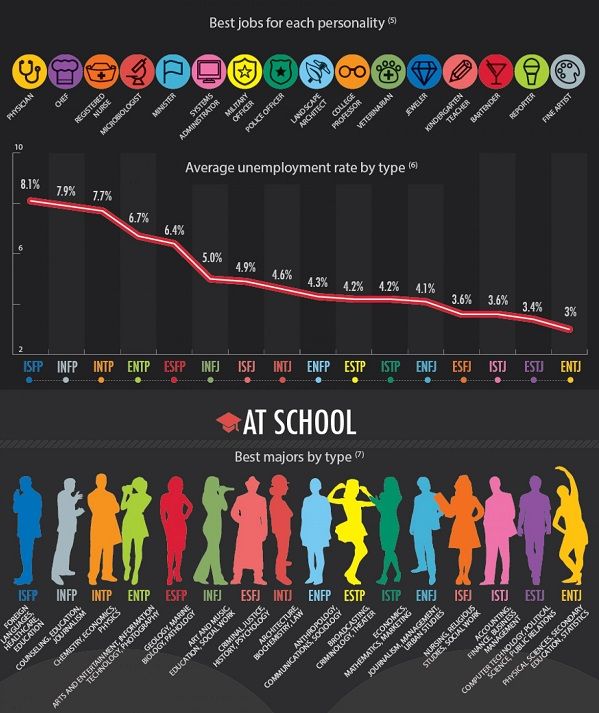 Their Intuitive nature allows them to spot the underlying principles in complex problems and propose creative solutions. Ultimately, The Logician is a deep thinker who takes many different perspectives into account. One of the greatest strengths they bring to a work environment is their detached, analytical mindset. They make decisions based on existing data and logic, and they strive to be as impartial as possible. This doesn’t make them narrow-minded thinkers; rather, because of their Intuitive preference, they are aware of the bigger picture.
Their Intuitive nature allows them to spot the underlying principles in complex problems and propose creative solutions. Ultimately, The Logician is a deep thinker who takes many different perspectives into account. One of the greatest strengths they bring to a work environment is their detached, analytical mindset. They make decisions based on existing data and logic, and they strive to be as impartial as possible. This doesn’t make them narrow-minded thinkers; rather, because of their Intuitive preference, they are aware of the bigger picture.
The best careers for INTPs revolve around theoretical problem-solving, while providing plenty of room for improvisation. The Logician is much more excited about conceptualizing rather than implementing. They would rather discover new ways of doing things – then leave the practical application to someone else.
Here are some jobs that are likely to strike their interest:
- Professor
- Scientist
- Archaeologist
- Architect
- Mathematician
- Artist
- Technical Writer
- Philosopher
- Strategic Planner
- Systems Analyst
- Computer Animator
- Computer Programmer
- Computer Specialist
- Economist
- Engineer
- Inventor
- Psychiatrist
- Psychologist
- Investigator
- Teacher
- Logician
- Marketer
- Translator/Interpreter
- Musician
- Network Specialist
- Judge
- Lawyer/Attorney
- Legal Mediator
- Project Manager
- Financial Planner
- Banker
- Researcher
- Consultant
- Photographer
NF Career Matches (Empaths)
NF personality types are empathetic and diplomatic, and they possess great people skills.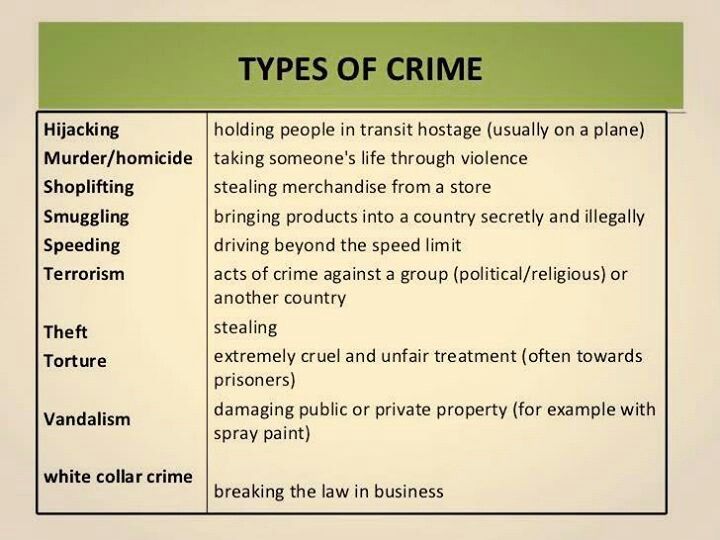 They enjoy helping others out, especially when it comes to providing them with emotional support. These people have an impeccable understanding of emotions, and their intuition is unmatched. Being as idealistic as they are, they often look for a job that bears a higher purpose in mind or helps solve an important world issue.
They enjoy helping others out, especially when it comes to providing them with emotional support. These people have an impeccable understanding of emotions, and their intuition is unmatched. Being as idealistic as they are, they often look for a job that bears a higher purpose in mind or helps solve an important world issue.
ENFJ Career Matches (The Guide)
The Guide is one of the most people-oriented personality types. Their interest is focused mainly on other people, and they prioritize others’ needs over their own. This is a fantastic quality to have, as they also have the tendency to bring out the best in everyone around them. The Guide’s Judging (J) preference leads them to be focused and prepared; they work best ahead of deadlines, planning the execution of a task in advance. They simply enjoy being organized and creating charts, schedules, lists, and anything else that can help them get a project finished.
The best job for ENFJs is one that combines their analytical skills with their fun, outgoing nature.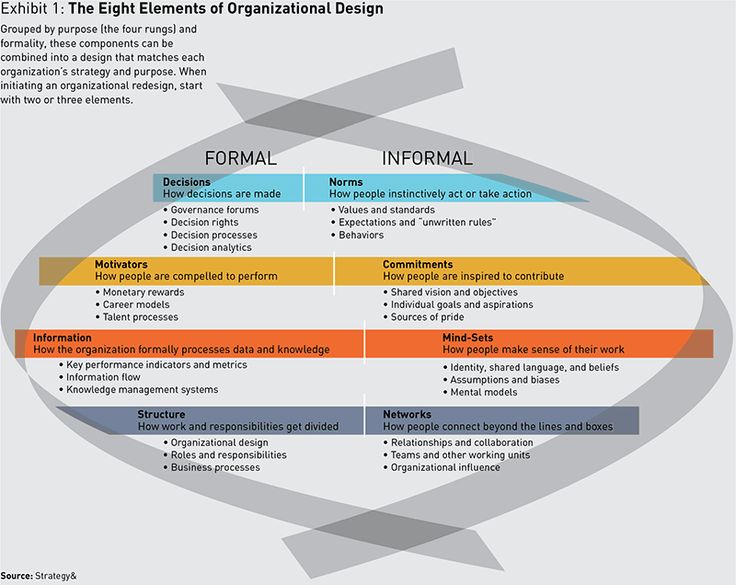 This is why they are mostly looking for a job that can combine both work and play. Their target is usually something creative with just the right amount of structure and deadlines. A job that involves a lot of detailed analysis or paperwork would likely result in ENFJs feeling pressured or exhausted. Ultimately, they do well in environments where they can foster meaningful personal connections.
This is why they are mostly looking for a job that can combine both work and play. Their target is usually something creative with just the right amount of structure and deadlines. A job that involves a lot of detailed analysis or paperwork would likely result in ENFJs feeling pressured or exhausted. Ultimately, they do well in environments where they can foster meaningful personal connections.
Here are some example of such jobs:
- Teacher
- Professor
- Social Worker
- Career Counselor
- Counselor
- Therapist
- Psychologist
- Psychiatrist
- Church Worker
- Trainer
- HR Specialist
- Librarian
- Writer
- Nurse
- Diplomat
- Consultant
- Artist
- Editor
- Administrator
- Actor/Actress
- Events Coordinator
- Facilitator
- Homemaker
- Musician
- Designer
- Engineer
- Occupational Therapist
- Politician
- Project Manager
- Sales Agent
- Senior Manager
ENFP Career Matches (The Optimist)
ENFPs are friendly and energetic workers.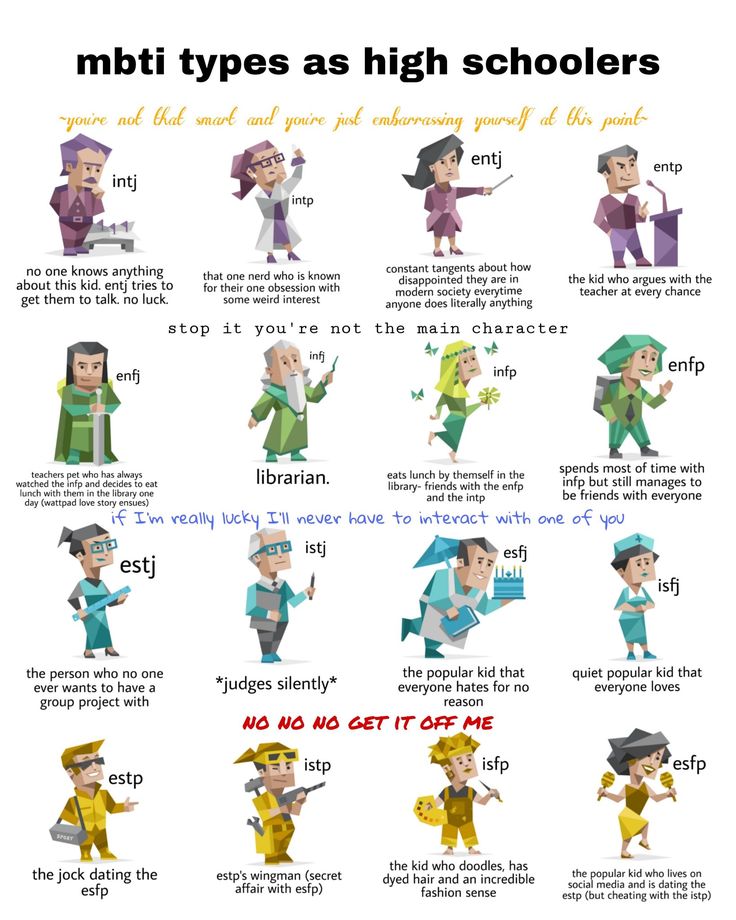 They prefer laid-back and flexible work environments, rather than ones that follow strict rules and order. Because of how creative and expressive they are in their work, The Optimist will want the chance to generate ideas and help others with innovative suggestions. Speaking of others, ENFPs feel very fulfilled when they get to cooperate with their colleagues. They find much joy in human contact and are very eager team members; they always have something to contribute with their signature innovation. This is why their creative approach might not be welcomed in the corporate world. Its rules and regulations are simply too restricting for them.
They prefer laid-back and flexible work environments, rather than ones that follow strict rules and order. Because of how creative and expressive they are in their work, The Optimist will want the chance to generate ideas and help others with innovative suggestions. Speaking of others, ENFPs feel very fulfilled when they get to cooperate with their colleagues. They find much joy in human contact and are very eager team members; they always have something to contribute with their signature innovation. This is why their creative approach might not be welcomed in the corporate world. Its rules and regulations are simply too restricting for them.
The perfect ENFP job must be a versatile one, where no two days are the same. It should present them with new challenges and opportunities and should be interesting enough to keep them from getting bored. This colorful personality type is happiest when their people-centered and creative nature can flourish.
Here are some examples of such jobs:
- Journalist
- Social Worker
- Conference Planner
- Diplomat
- Writer
- Nurse
- Public Relations
- Politician
- Housing Director
- Editor
- Broadcaster/Newscaster
- Teacher
- Professor
- Musician
- Lawyer/Attorney
- Church Worker
- Counselor
- Therapist
- Psychologist
- Art Director
- Project Manager
- Artist
- Painter
- Actor/Actress
- Merchandise Planner
- Career Counselor
- Speech Pathologist
- Entrepreneur
- Dietitian/Nutritionist
- Human Resources
- Consultant
- Marketer
- Occupational Therapist
- Social Scientist
INFJ Career Matches (The Sage)
INFJs are extremely idealistic, caring, and thoughtful people. Nicknamed The Sage, they prefer to carry out meaningful tasks that can positively influence the world. The INFJ will be a helpful and reliable team member (who sometimes takes on more than they are realistically capable of doing). This might be because of their heightened sense of responsibility, both for their work and for the others who work with them. They are always willing to help and will even stay later than their working hours to make sure everything is completed to their own high standards.
Nicknamed The Sage, they prefer to carry out meaningful tasks that can positively influence the world. The INFJ will be a helpful and reliable team member (who sometimes takes on more than they are realistically capable of doing). This might be because of their heightened sense of responsibility, both for their work and for the others who work with them. They are always willing to help and will even stay later than their working hours to make sure everything is completed to their own high standards.
A job INFJs would feel most comfortable in is one that is highly consistent with their strong value systems. This personality type is extremely altruistic and wants their actions to impact the world in a positive way. The Sage is caring and thoughtful, and they achieve a great sense of satisfaction from helping others. This is why they are so well-suited to careers in humanitarian fields. Given INFJs’ deep empathy and superior understanding of people’s feelings and emotions, an occupation that deals with people can be very good for them.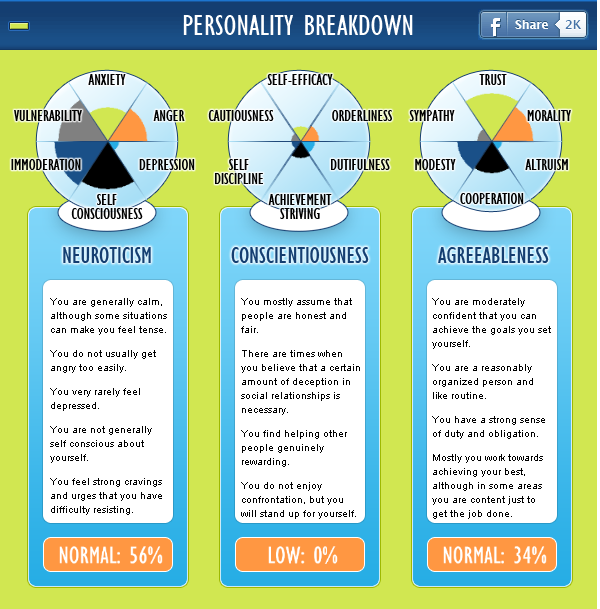
Here are some career matches that The Sage can potentially find great enjoyment in:
- Counselor
- Clergy
- Therapist
- Writer
- Missionary
- Psychiatrist
- Psychologist
- Social Worker
- Educational Consultant
- Child Care
- Child Development
- Church Worker
- Teacher
- Musician
- Photographer
- Professor
- Librarian
- Artist
- Actor/Actress
- Medical Doctor
- Alternative Medicine
- Designer
- Human Resources
- Trainer
INFP Career Matches (The Mediator)
INFPs want to feel a sense of purpose in their work. They put very serious emphasis on balance and harmony, which is why they would likely be willing to take the extra effort to establish strong emotional and moral connections with their work. You can always count on INFPs to be honest and considerate of the work ecosystem as a whole. In the best case scenario, INFPs thrive when they are put together with like-minded people who share their working style and their passion to make a meaningful difference in the world. In nearly any scenario, though, the harmonious and gentle personality of The Mediator makes them likable to others, and generally, they are perceived positively by their coworkers.
In nearly any scenario, though, the harmonious and gentle personality of The Mediator makes them likable to others, and generally, they are perceived positively by their coworkers.
Being introverted, INFPs don’t mind spending time alone. In fact, it’s crucial for their mental wellbeing and happiness. This is why people from this personality type should avoid the open office environments often found in big corporations, as they don’t allow for this much needed solitude. To INFPs, any job that puts them on the spot or requires them to be in front of a big audience simply won’t do.
Here are some career matches that are good for INFPs:
- Activist
- Church Worker
- Missionary
- Educational Consultant
- Social Worker
- Physical Therapist
- Fashion Designer
- Counselor
- Teacher
- Musician
- Therapist
- Actor/Actress
- Artist
- Journalist
- Professor
- Minister
- Filmmaker
- Librarian
- Editor
- Graphic Designer
- Writer
- Psychologist
- Translator/Interpreter
- Social Scientist
- Web Designer
- Photographer
- Human Resources
- Video Editor
- Holistic Health Practitioner
- Speech Pathologist
- Employee Development Specialist
- Researcher
Note that each person, even of the same type, is different and no career in these lists should be considered as an automatic perfect match.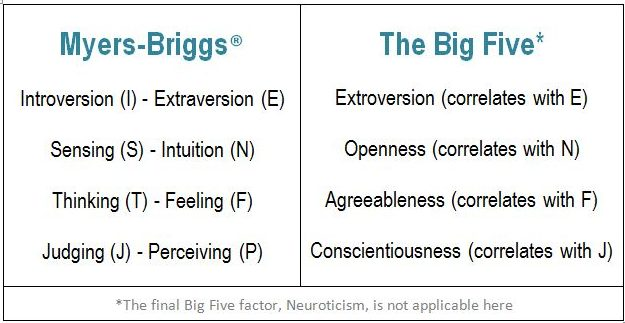 These lists should be taken as suggestions for exploration.
These lists should be taken as suggestions for exploration.
Classification of employees by personality types
Audio version of this article
The manager must be able to determine the nature, inclinations and behavior of subordinates. It helps to improve workflow, distribute tasks and maintain a favorable atmosphere in the team
Content
What is a personality type
Why determine employee personality types
Personality types of employees: their advantages and disadvantages
Business environment
Business knowledge and services platform
Open an IP now
Premium business environment
Join a private club and get access to business development materials
Try for free at 14 days
What is a personality type
Each person is individual. There is no personality that is completely suitable in all respects for one of the types. In each individual, several psychotypes are combined, one of which manifests itself brighter than the others. nine0016
There is no personality that is completely suitable in all respects for one of the types. In each individual, several psychotypes are combined, one of which manifests itself brighter than the others. nine0016
For a leader it is necessary to know what a subordinate has:
These factors determine the personality type.
Character determines a person's behavior, attitude to the world around him. Character is formed on the basis of temperament under the influence of education, environment and experience. Most of a person's actions are explained by upbringing or temperament.
Abilities are individual characteristics, inclinations to any kind of activity. Thanks to them, one person can easily cope with a task that another cannot. Strongly expressed abilities are called talent or giftedness. But they need development. Without labor, special studies and additional knowledge, any talent can be lost or go unnoticed. nine0016
The needs of a person include many aspects of life. These are not only items necessary for existence or desired. This includes ideological attitudes, interests, creative self-expression.
These are not only items necessary for existence or desired. This includes ideological attitudes, interests, creative self-expression.
The ability to achieve the set goal is the ability to plan one's activities so that efforts lead to the desired result.
Why determine the personality types of employees
It is important for the head of an organization to find ways to activate the potential of each employee individually and the entire team. This requires understanding and taking into account the psychology of subordinates. nine0016
The ability to understand personality types will help the business owner to rationally distribute employees to jobs and responsibilities between people, to achieve optimal labor productivity.
These skills will also allow you to properly build relationships with subordinates so that they can maximize their potential and realize their competencies.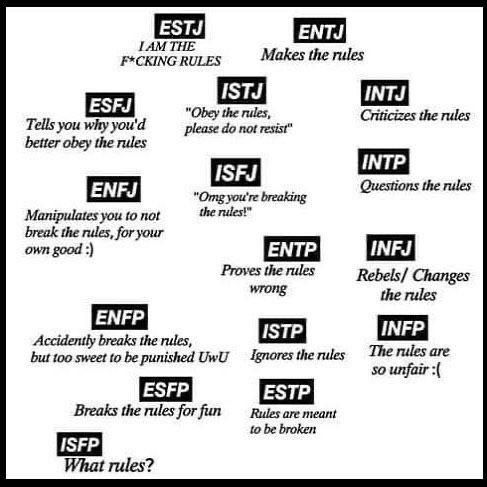
Personality types of employees: their advantages and disadvantages
In the 1940s, Isabelle Myers-Briggs and Katherine Briggs, based on the research of the Swiss psychiatrist Carl Jung, created a test. He was supposed to help determine the characteristics of the character of people, ways of avoiding conflicts, ways of personal development. Sociologists supplemented this work. nine0016
Each type has its own characteristics. With the right approach to the individual, the right distribution of responsibilities between individuals, the team demonstrates high results.
From the descriptions below, you can draw conclusions about what to expect from a person of one type or another, who can work autonomously, and who needs to be closely monitored.
Virtuosos
Pragmatists who are well versed in their work. They perform their duties perfectly when their work is visible, and the result can be evaluated.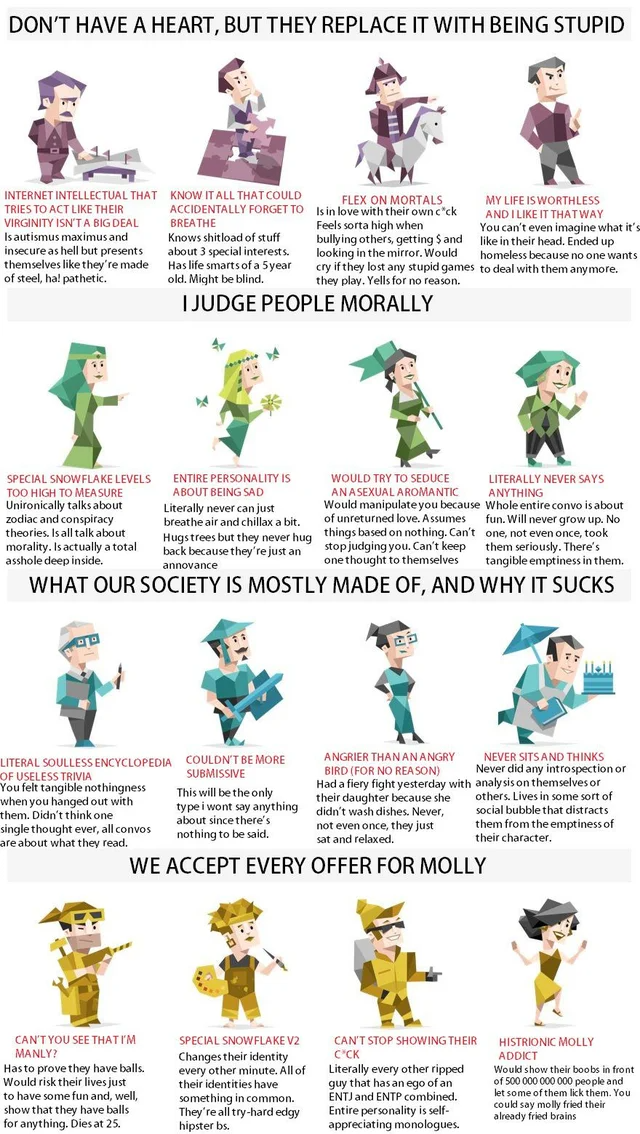 Masters of their craft who constantly need stimulation in the form of personal praise or material incentives. nine0016
Masters of their craft who constantly need stimulation in the form of personal praise or material incentives. nine0016
Collectivism, teamwork is not for them. Lost among others, not seeing the publicity of the results, the "virtuosos" quickly lose their incentive to work, and begin to perform their duties worse.
They can be given difficult tasks. Being calm and practical, "virtuosos" are able to find rational solutions in difficult situations.
❗️ Advice
Those who show organizational skills can be trusted to lead a small group of employees or a project. Such activity will highlight the "virtuoso" in the team, make his efforts noticeable. nine0016
Among the shortcomings of these individuals is a tendency to underestimate their abilities and fear of criticism. Because of the desire to be ahead at all costs, they often experience burnout, become depressed or fall ill.
📌 Advice
"Activists" are not recommended to entrust individual tasks.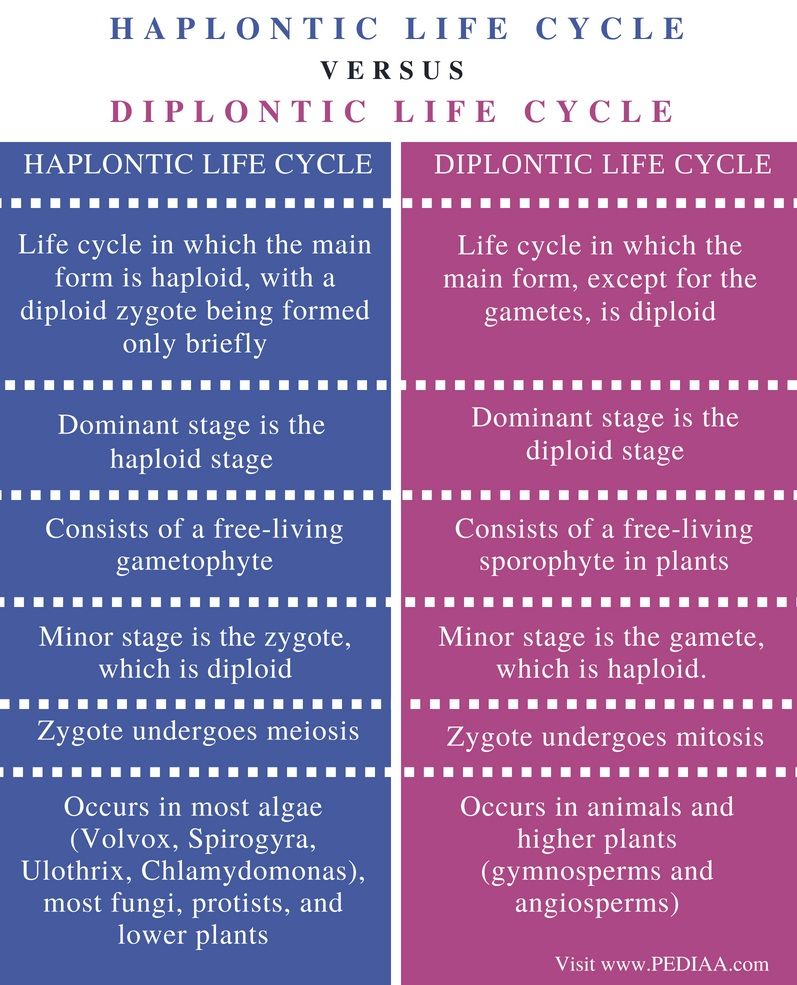 Best of all, representatives of this type reveal their potential by working in a team, in public. With great pleasure they work in leadership positions. The best solution would be to appoint such employees as senior in a group, shift, department. nine0016
Best of all, representatives of this type reveal their potential by working in a team, in public. With great pleasure they work in leadership positions. The best solution would be to appoint such employees as senior in a group, shift, department. nine0016
It is necessary to ensure that the “activist” does not take on too much responsibility, praise such an employee more often, give him the opportunity to fully relax.
Logisticians
Conscientious and hardworking employees. Responsible, often are universal specialists. At work, they are scrupulous, punctual and corrosive. "Logistics" respect the hierarchy, always follow the rules, disciplined. They are consistent, calm, do not miss deadlines.
Among the shortcomings can be called the fear of change, the struggle with progressive undertakings, the inability to think creatively. "Logisticians" do not participate in the development of new ideas or plans for their implementation, but become indispensable in the process of their implementation.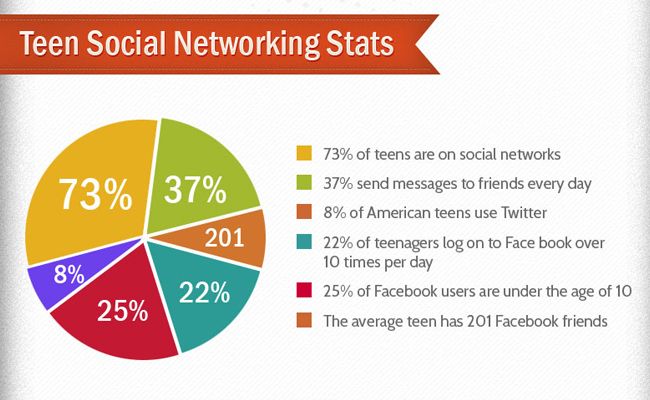
Assuming leadership duties, these employees require strict adherence to the plan. They hardly take into account other people's feelings. They are prone to tough decisions and criticism.
Telegram Business environment
More benefits for you and your business every day in our Telegram channel
Subscribe to Telegram
Controversial
People of this psychotype do not like hierarchy. For them, there are no authorities by position, subordination is not for them. "Controversialists" gush with ideas, demand changes, innovations. They express their thoughts to everyone in a row, regardless of the position of the person with whom they are talking.
Such employees may be inconvenient for managers. However, when used correctly, they bring great benefits. All significant discoveries were made by them or thanks to people of this type of personality. They are able to think outside the box, generate non-standard solutions, in whatever area they work. nine0016
They are able to think outside the box, generate non-standard solutions, in whatever area they work. nine0016
"Controversialists" feel great in leadership positions. These erudite specialists are able to obtain information from various sources and put it into action. Sociability, sense of humor have colleagues to them.
Articles
How to interview
Search and recruitment
Advocates
You can always rely on them. "Defenders" are responsive, kind, always ready to help. In case of any complications at work, they will not stand aside, whether it concerns collecting money for a colleague in trouble, or replacing a sick colleague on their day off. nine0016
For a business owner, an “altruist-protector” is a godsend. Loyal, friendly, he will try to extinguish any conflict. However, reliability often harms these individuals. Unable to say no to superiors and colleagues, such a person often performs other people's functions, takes on extra responsibility.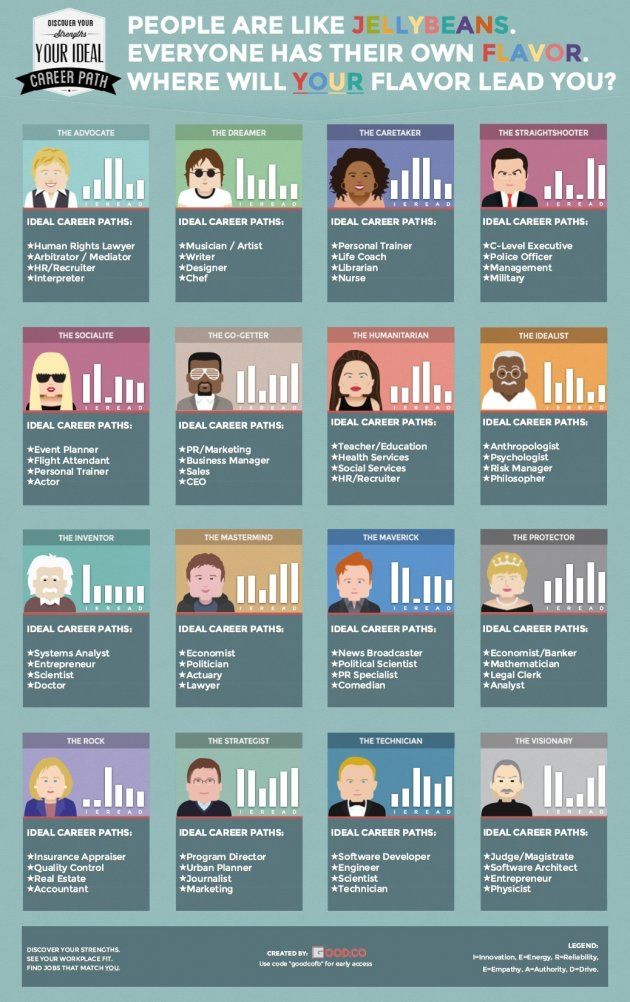 This results in stress and burnout.
This results in stress and burnout.
❗️ Attention
It is not recommended to put a "protector" in leadership positions. Such an employee will not distribute duties, but will strive to do everything independently. At the same time, it will be extremely difficult for him to demand the fulfillment of duties and fine his subordinates. nine0016
Artists
This personality type includes active, creative people who are able to make decisions, independently find original ways to achieve goals. Artists don't like being controlled. However, the labor process captures them - they know how to turn any routine into an interesting job.
Artists love to learn and solve problems. It is important for them to feel that they are valued, so the manager needs to praise such employees as often as possible and encourage them. nine0016
❗️ Attention
Despite high communication skills, excessive social activity can exhaust "artists". However, the priority of personal goals sometimes interferes with their work.
However, the priority of personal goals sometimes interferes with their work.
Occupying leadership positions, "artists" are ready to do a lot for the sake of success. A company under their leadership can reach great heights. But the main thing for such people is not the achievements of the team, but the fact that the breakthrough was made thanks to them. Sometimes "artists" appropriate other people's merits.
Disadvantages of representatives of this type of personality include:
Premium Business Environment
Join the Private Entrepreneur Club and get support from the business community
Trial Free for 14 days
Entrepreneurs
This personality type includes people who are energetic, smart, and value risk. In every mistake they see a positive, they know how to benefit.
Noisy, spontaneous and cheerful "entrepreneur" adaptive, solves problems as they arise.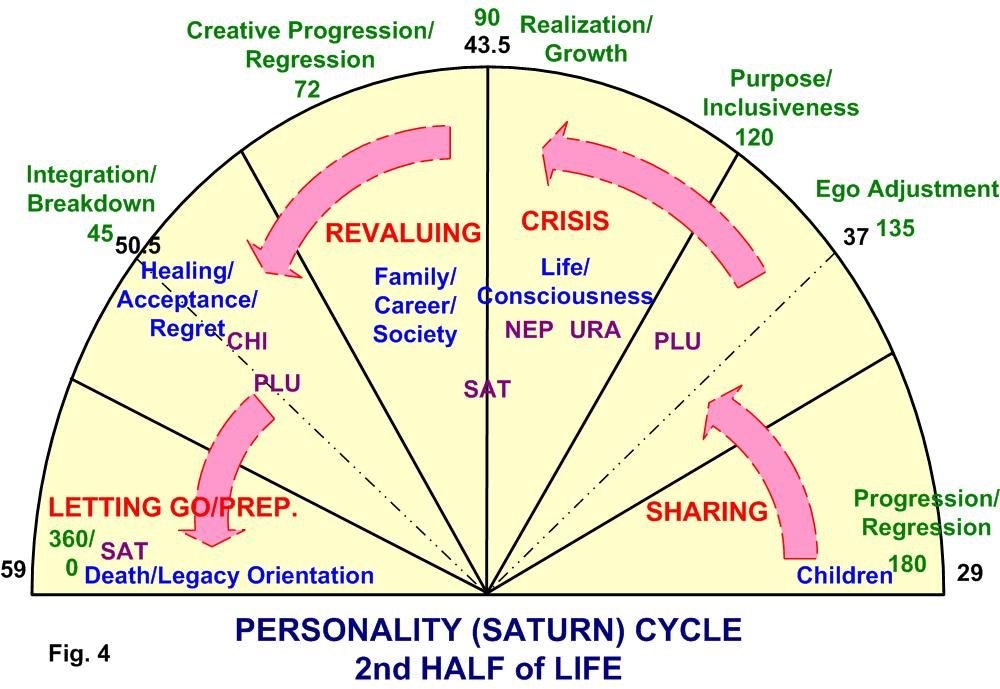 Representatives of this type are distinguished by such character traits as the ability to easily find solutions, love for experiments, and the demand for attention to their ideas.
Representatives of this type are distinguished by such character traits as the ability to easily find solutions, love for experiments, and the demand for attention to their ideas.
“Entrepreneurs” are problematic subordinates, because they often break the rules and do not like to do routine work. However, they turn out to be valuable workers, if you outline the scope of their duties and direct energy along the right path. nine0016
📌 Tip
“Entrepreneurs” need to be given creative tasks, such as organizing an event, organizing logistics, keeping a raging client.
Personalities of this type apply for leadership positions. Practical “entrepreneurs”, striving to improve the labor process, will bring many benefits to production. Pragmatism and prudence will allow them to optimize processes, increase company profits, and increase team productivity.
Intermediaries
People of this type are distinguished by poise, adherence to principles, and a benevolent attitude towards others.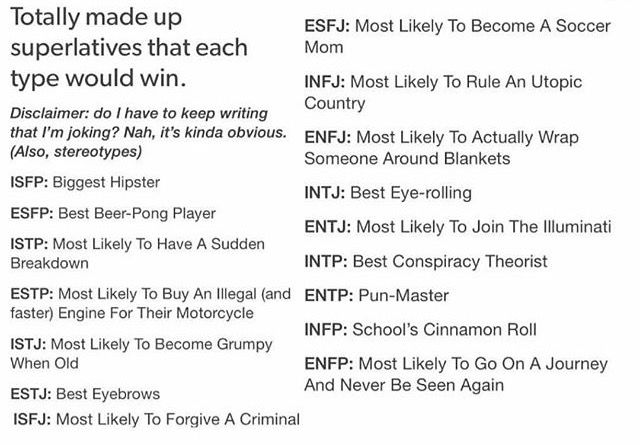 They have a developed value system and a high bar. Often "intermediaries" are introverts, immersed in themselves and their ideas. Appreciate comfort.
They have a developed value system and a high bar. Often "intermediaries" are introverts, immersed in themselves and their ideas. Appreciate comfort.
Such an employee can be a support to the leader if his opinion coincides with the collective one. However, due to their adherence to principles, “intermediaries” are often disappointed in their colleagues. Without being able to express their opinion, the “mediators” burn out. nine0016
It is not worth appointing such an employee to a managerial position. It is better to communicate with him in private, to be interested in his opinion, to support.
The mediator is able to adequately assess the situation and give balanced advice, as he has a heightened sense of justice.
Architects
Distinguished by organization and responsibility. These are perfectionists who love accuracy in everything. They respect other people's ideas, but rarely generate anything interesting themselves.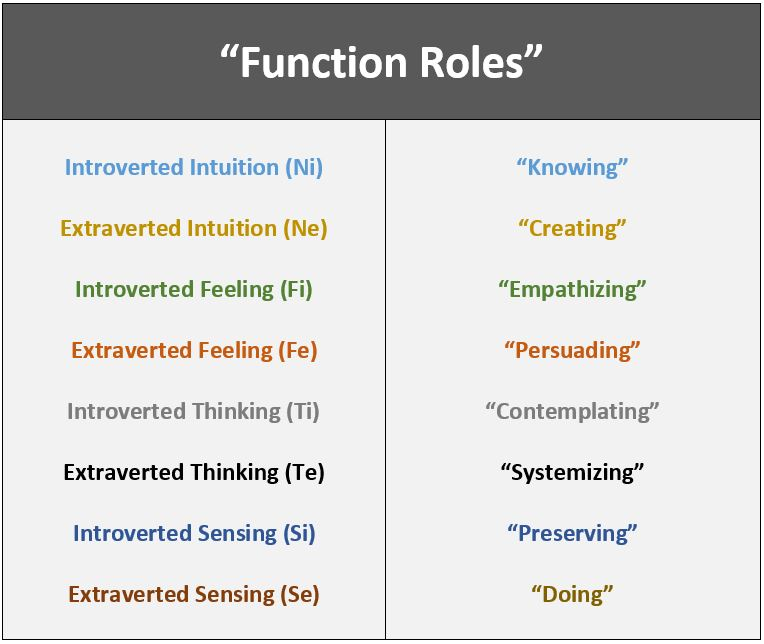 But "architects" better than others will implement innovations in production, relying on rationalism and developed intuition. nine0016
But "architects" better than others will implement innovations in production, relying on rationalism and developed intuition. nine0016
Their shortcomings:
-
desire to complete the task on time at any cost,
-
inability to work on tight deadlines,
-
inability to work in a team.
"Architects" are recommended to give individual tasks, control the implementation, but do not urge, leaving time for reflection. You should not appoint them to leadership positions, since the desire to get the highest quality result from subordinates will quickly deplete the “architect”. nine0016
Articles
How to find a team for a startup
Search and recruitment
Adventurers
Universal assistants to the manager. They are friendly, active and easy to train.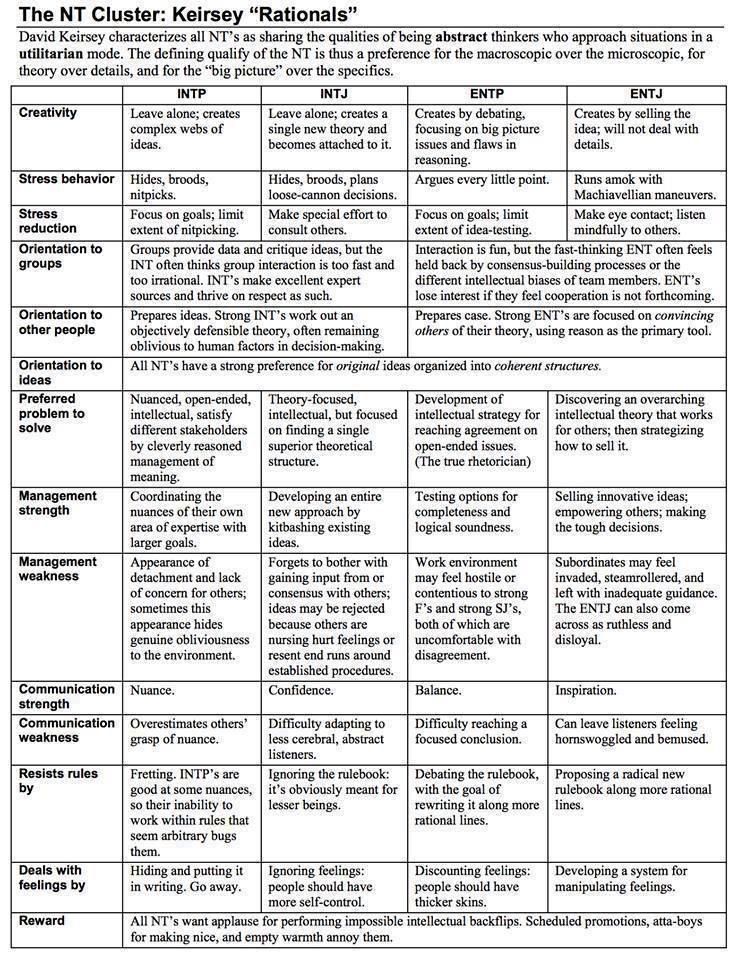 "Adventurers" gladly accept innovations, plunging into the matter in their head. For them, the material reward of merit and the result are not so important - they are fascinated by the labor process.
"Adventurers" gladly accept innovations, plunging into the matter in their head. For them, the material reward of merit and the result are not so important - they are fascinated by the labor process.
The positive qualities of an "adventurer" are purposefulness, dedication to business. Sometimes this turns into a disadvantage if a person forgets about rest, lunch, or is ready to act dishonestly for the sake of the result. nine0016
It is difficult to keep such an employee within limits. He needs constant supervision. Burnout and nervous exhaustion are frequent companions of such people.
Having determined the psychotype of each applicant for a particular position in the company, the business owner can assemble an effective team, where the strong qualities of employees will work for common success, and shortcomings will be compensated. Tests developed by psychologists help in diagnosing personality types.
🚀 Service for quick business start
Register a business for free and without a visit to the tax office - through the service from the Business Environment
Apply online
Types and Types of Employees in the Organization [Characteristic + Examples]
Why classifications of types of employees are needed
Types of employees used in personnel management do not divide workers into useful and not very useful.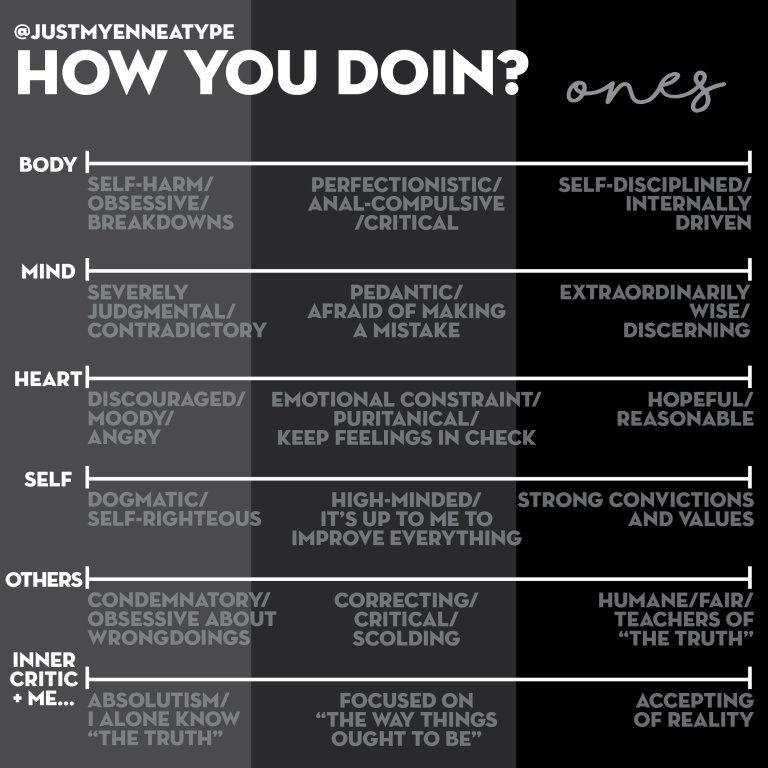 They allow you to identify suitable candidates for positions for business in specific conditions.
They allow you to identify suitable candidates for positions for business in specific conditions.
Select candidates according to company objectives
Use the test to determine the personality type of job seekers
Start testing
A harmonious, stable team brings together people with different personal characteristics, psychological characteristics. The strengths of individuals balance the weaknesses, and the result of their interaction leads to the desired result for the company.
When testing for a psychotype according to various criteria, the employer determines :
- conformity of character, personality traits to the work assigned; nine0005
- motivational interests of members of the labor collective;
- appropriate methods of interaction with the employee;
- the degree of compliance of the applicant's worldview with the corporate culture.
Most of the methods used are of an appraisal, applied nature.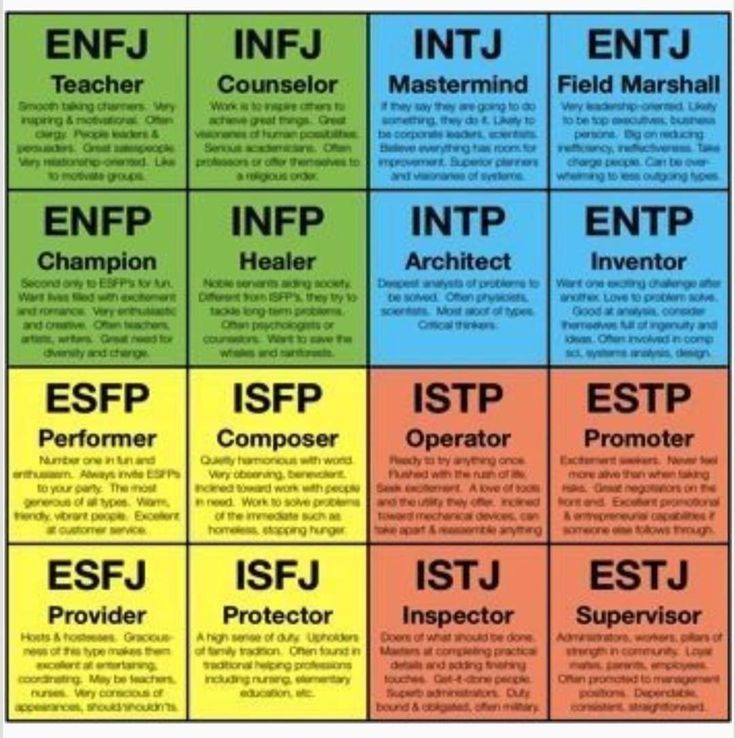 Many of them were developed by personnel specialists together with psychologists and tested in practice. Companies choose the classification that suits them best and use it.
Many of them were developed by personnel specialists together with psychologists and tested in practice. Companies choose the classification that suits them best and use it.
Having knowledge about the personality types of employees, HR managers and managers can more effectively establish communication and interaction with the team.
The main tasks that are solved when using the breakdown by type :
- Determining the role of everyone in the team.
- Development of the most appropriate ways of obtaining knowledge.
- Knowledge of the strengths and weaknesses of the personality, the degree of correspondence of the psychotype to the chosen work. nine0005
- Determining the direction of activities to smooth out conflicts and selecting applicants for the company's management style.
- Choosing the best ways to encourage.
By balancing the negative manifestations of characters, the maximum use of the positive personality traits of workers, it is possible to achieve the desired result and effectively manage human resources.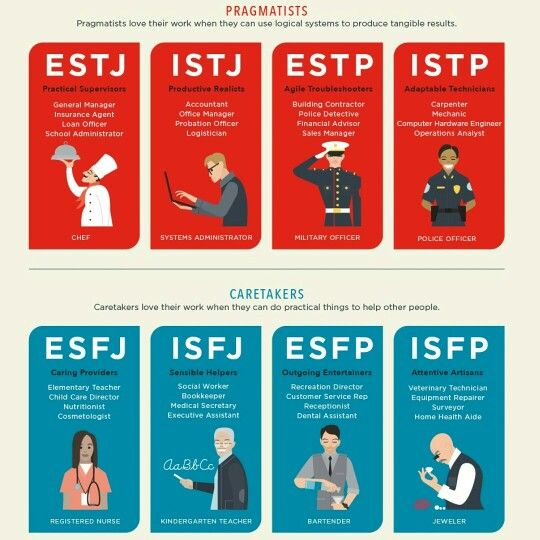 Managers need to find an approach to each type of employee.
Managers need to find an approach to each type of employee.
How the staff is divided by types of motivation
It is not advisable to use the same incentives for all social and professional groups. For some, only money is important, for others - recognition, others like calm, measured, routine activities.
| Type of employee | Characteristics | Preferred form of remuneration |
|---|---|---|
| Lumpenized | • not selective about the type of work; • satisfied with a low salary, but only if others do not receive more; • has a low qualification and does not want to improve it; • does not show initiative and sabotages the activity of others, resists any change; • avoids responsibility and great efforts to achieve the goal, does not seek to manage anything. | Time payment. |
| Instrumental | • money, labor cost, not its content are primary; • wants to clearly understand what they are paying for, does not like favors; • strives to provide for himself. | Piecework, with a high proportion of the variable part depending on the results. |
| Professional | • primary job content, regardless of pay level; • wants self-expression and recognition through work; • yearns for professional recognition; • wants independence, seeks to participate in solving work issues. | Time-based, depending on the qualification and complexity of the work. |
| Patriotic | • ready to work for an idea if it is attractive to him; • strives to gain social recognition and participation in collective success; nine0016 • wants to know that he is irreplaceable in the company. | Time or piecework with a small variable part depending on the overall result of the company. |
| Master type | • wants to take responsibility; • requires a lot of freedom of action; • does not like being controlled by anyone. | Piecework or hourly pay based on individual or collective performance. nine0016 |
To assess which types of employees correspond to certain types of motivation, the Motype test developed by V.I. It includes 18 questions and requires no more than half an hour to complete. Suitable for government and commercial institutions.
Types of employees depending on their professional inclinations
0014 Honey-Mumford test . This method was developed in 1986 by Alan Mumford and Peter Honey. Initially, it was formed to determine the style of learning, but has found wider application.
What types of employees can be identified by the Honey-Mumford test:
- Doer.
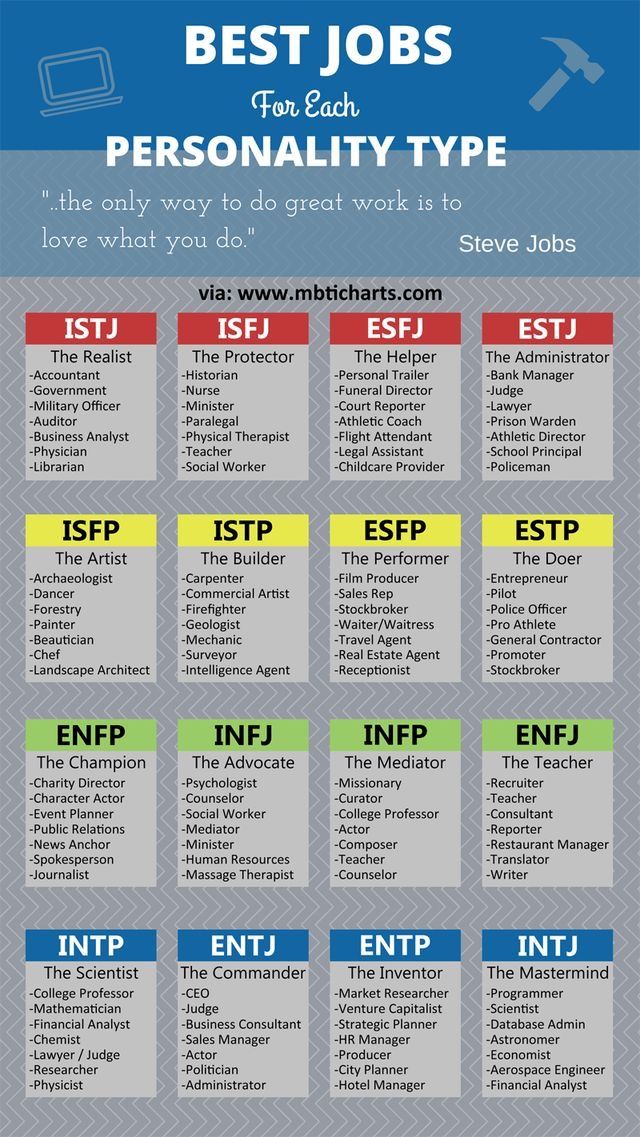 Prone to immediate action, but unable to work hard for long periods of time. Impulsive, active, unpredictable. Happy to accept anything new.
Prone to immediate action, but unable to work hard for long periods of time. Impulsive, active, unpredictable. Happy to accept anything new. - Thinker. The complete opposite of a doer, thoughtful and cautious. Will not act until he weighs each step. Unsociable, voices his thoughts only when he is sure of the result.
- Theorist. Builds complex models based on observations, prone to comprehensive analysis. Likes rules, norms, clear instructions. He prefers to reach everything himself without outside help and look for the right solution.
- Pragmatist. Immediately begins to implement the idea that interests him. Strives to solve complex problems, has good business acumen. Immediately gets to work, does not like reflections. He sees any problem as an opportunity. nine0005
Based on the results of the tests, the types of employees and their inherent inclinations are determined. They learn how the staff will act when problems arise, and how each employee uses their knowledge and skills in practice.
Classification according to professional qualifications and involvement
There is also a more practical classification of employee personality types depending on their attitude to the profession and the company. The basis for separation is internal motivation, the desire to benefit the employer, to share his goals. nine0016
Groups of employees by degree of involvement and professionalism:
- Fanatic. Ambitious, dedicated to the company, almost the perfect employee. Always ready to do more than required. Considerable attention is paid to the quality of work, always brings the matter to the end.
- Good professional. Has a high level of skill, but does exactly what is required. Although he shows decent results, he is not ready for a labor feat for the sake of the company. Able to improve his professional level as needed. nine0005
- Bad employee. A low-skilled worker who performs tasks to the best of his ability.
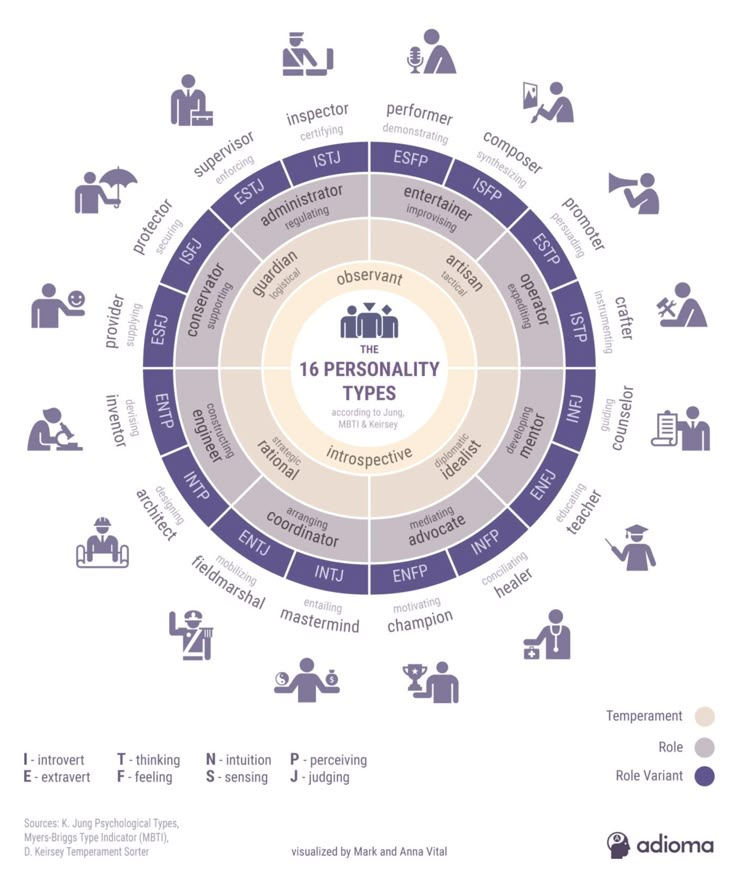 Does not seek professional development.
Does not seek professional development.
In their pure form, these groups practically do not occur and include subtypes. Additional separation depends on whether the interests of the employee coincide with the goals of the company, whether he realizes the importance of interacting with colleagues.
Zealot:
- Heroic subtype. nine0015 Sacrifices his time and income to do his best work. He perceives professional failure as personal. Has managerial potential.
- Technology subtype. Distinguished by outstanding technical training. Realizes the tasks of the company, not forgetting about his own interests. Interested in equal, partnership relations with the employer.
- Innovation Generator. In his work he is guided only by his own ideas. The rationality of his proposals and the availability of financial opportunities for the company does not bother him. nine0005
- Uncontrollable know-it-all. Able to implement his proposals even at the expense of excessive use of company resources.
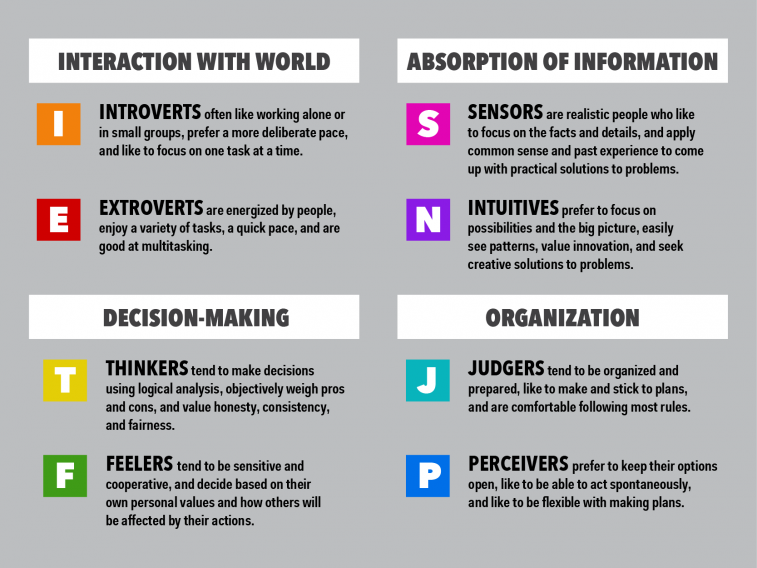
- Unappreciated Inventor . Does not fit well with company policy, but believes that in fact he is underestimated. From wrecking, he is restrained only by good relations with colleagues or the leader.
- Internal competitor. Comes into conflict with the rest of the team in order to show himself. nine0005
- Lone professional. Prefers to do quality work on time, but without outside help.
- Dark genius. For the sake of realizing his own ambitions, he is able to harm the company. Sees it as a resource to achieve their goals.
Good professional:
- Modest. Works on orders, qualitatively, without initiative, but is highly qualified.
- Partner. Ready for contacts, highly qualified, disciplined and punctual. Shows initiative, but not always on time. nine0005
- Passenger. His interests lie outside the goals of the company. Despite professionalism, ready to leave at any moment.
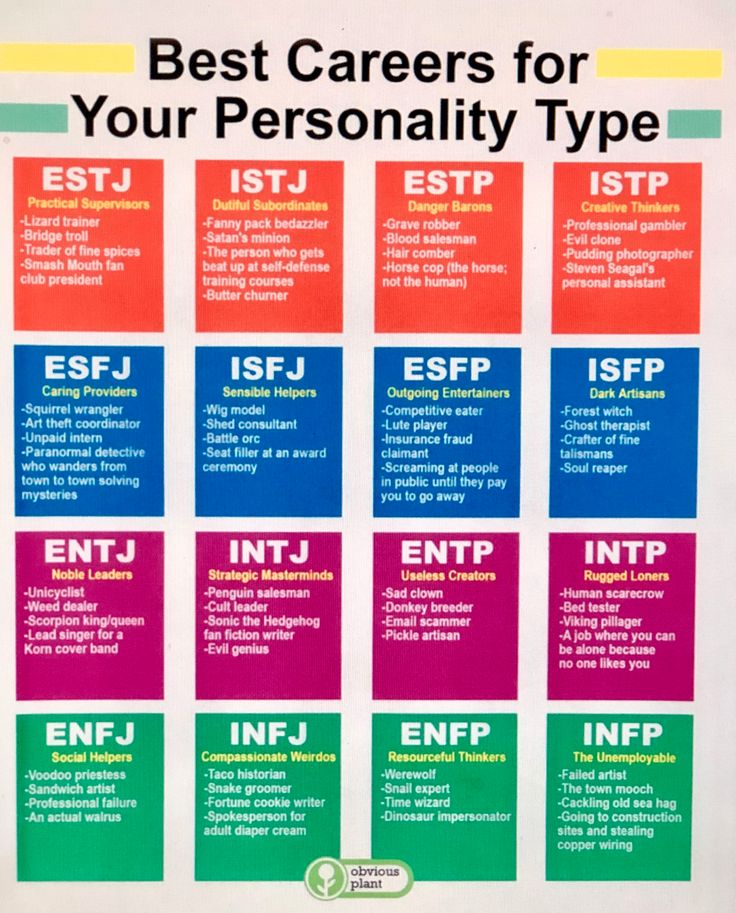
- Travel companion. Professional, energetic, but concerned with achieving personal well-being, not company goals. Has high communication skills.
- Performer. Lack of initiative, although it has sufficient potential. Shows activity only in typical situations with a known result.
- Observer. nine0015 Does his part of the work and does not link it to the interests of others.
- Saboteur. A highly skilled worker who does not share goals with the company. At the first opportunity, he tries to harm the process. Often these are people after demotion.
Bad worker:
- Whipping boy. An incompetent employee who is very proud of his belonging to the company, therefore, is ready to make sacrifices for the sake of colleagues. nine0005
- Public organizer. Attempts to compensate for incompetence by playing the role of an informal leader or informer of the leader. Strives to stand out against the general background, but not at the expense of results in work.
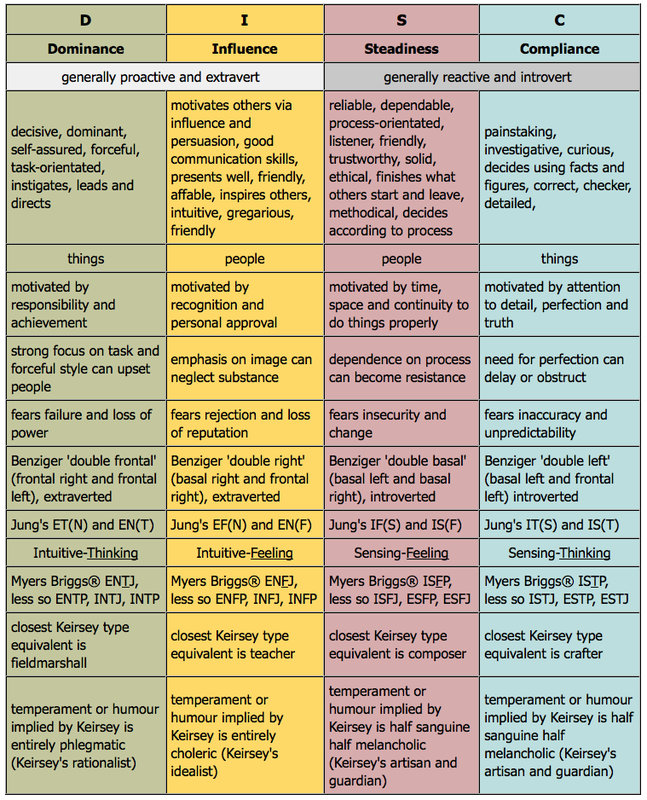
- Quiet. Tries to be inconspicuous, due to which he can hide his incompetence. He behaves like an eternal newcomer to the team.
- Outcast. An employee who understands his precarious position and tolerates any comments. They break up with him the fastest. nine0005
- Parasite. Selects a qualified worker, builds relationships with him and survives by copying his behavior.
- Revolutionary. An employee who cannot fit into the company in any way, but promotes innovation. In fact, he wants to remake the processes for himself.
For grouping, it is advisable to use the Schubert questionnaire . In the future, based on the results obtained, it is possible to distribute employees and adjust approaches to management and motivation methods. nine0016
Classification of employees from a position of loyalty
Depending on the behavior in the course of performing work functions and loyalty to the employer, 9 categories of workers are distinguished . Below we consider each of them in more detail.
Below we consider each of them in more detail.
| Type | Characteristics |
|---|---|
| Hyperthymic | Active, sociable employee, showing loyalty not to the position as such, loyalty to a specific person. nine0432 |
| Austic | Loyal to the company and management, but does not show it outwardly, while possessing high professional qualities. |
| Labile | An employee who is committed to the company, but is characterized by mood swings. |
| Demonstrative | An employee puts on a theatrical show, rarely a true professional. Changes job when a feeling of "unrecognized" arises. |
| Psychasthenic | Rational, smart, but not self-confident, loyal for moral reasons. |
| Stuck | Loses loyalty at the slightest remark to work from management, unable to listen to criticism.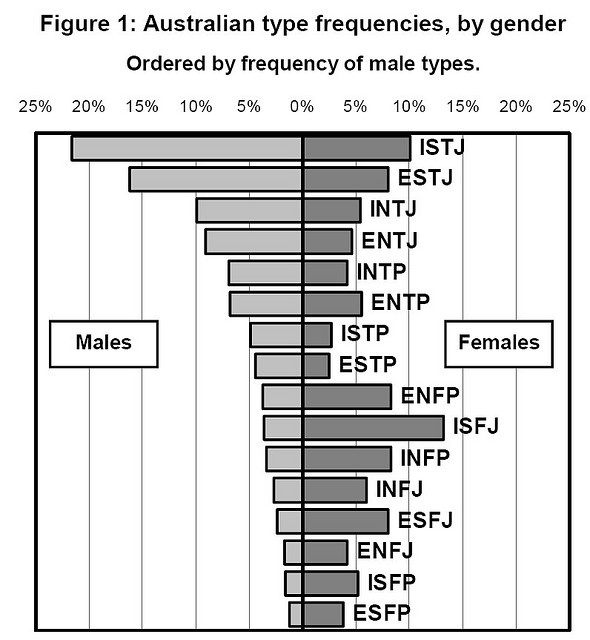 |
| Conformal | Adapts to the employer along with the rest of the team, works little and often half-heartedly, needs constant monitoring by management. |
| Unsteady | Loyalty is ensured only by constant pressure on him. Not burdened with moral principles and lazy, lacking business acumen. |
| Cycloid | Kind, sympathetic, but with sharp changes in the level of efficiency and mood. Requires an individual approach. |
Management needs to build relationships with employees based on this breakdown. At the same time, you need to understand that the dismissal of disloyal people cannot solve the problem, since there are no guarantees that employees newly hired for production and office will not belong to the same psychotype. 9 would be good for rating.0014 Leonhard test .
Conclusions
It is necessary to evaluate the types of personnel based on the specific tasks of the company or manager, but this should not be an end in itself.